Daniel Allington
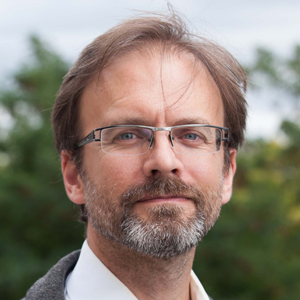
Computational social scientist
Daniel Allington is a computational social scientist with a particular interest in studying how the cultural industries have adapted to digitalisation. For the last several years, his research has focused on online misinformation and hate and their consequences for the offline world. He is currently working on two major funded projects: Decoding Antisemitism: An AI-driven Study of Hate Speech and Imagery Online, funded by the Alfred Landecker Foundation, and Social Trust, Crisis Perceptions, and Viral Misinformation over the Course of the Covid-19 Emergency Period, funded by the Economic and Social Research Council.
Jutta Allmendinger
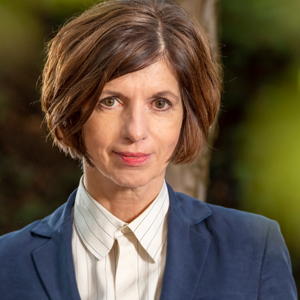
President of the Berlin Social Science Center (WZB) and Professor of Sociology in Education and Labor Market Research at Humboldt Universität Berlin
Prof. Dr. h.c. Jutta Allmendinger, Ph.D., is President of the Berlin Social Science Center (WZB) and Professor of Sociology in Education and Labor Market Research at Humboldt Universität Berlin since 2007. In addition, she has served as Honorary Professor of Sociology at Freie Universität Berlin since 2012. Jutta Allmendinger studied sociology and social psychology in Mannheim and Madison, Wisconsin, earned her Ph.D. at Harvard University and her habilitation degree at Ludwig Maximilian University (LMU) in Munich. Her multiple honors and awards include the German Federal Cross of Merit First Class and the Communicator Award - Science Award of the Donors' Association (Stifterverband für die deutsche Wissenschaft). Jutta Allmendinger serves on numerous advisory boards in Germany and abroad. She is a member of the Berlin Brandenburg Academy of Sciences and Humanities, the German Academy of Engineering Science acatech and the German Academy of Sciences Leopoldina. Photo credit (c)WZB/David Ausserhofer
Geneviève Almouzni
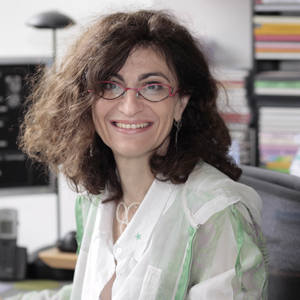
ERC Scientific Council member and a member of the Gender Issues Working Group
Geneviève ALMOUZNI, PhD (EMBO member, Member of the French Academy of Sciences, fellow of the American Association for the Advancement of Sciences, Director of the Research Center of the Institut Curie from 2013 to 2018 and honorary director since then) is director of research exceptional class at the CNRS. She is Principal Investigator of the Chromatin dynamics team in the Nuclear dynamics research Unit (UMR3664 CNRS/Institut Curie) since 1999. She is a world leader in understanding genome organization and function during development and disease, in particular in cancer. She has combined biochemistry, cell biology and physical approaches with advanced imaging to explore chromatin dynamics. Overall, G. Almouzni authored more than 220 publications and deposited 5 patents. She coordinated the EpiGeneSys Network of Excellence to move epigenetics towards systems biology. She is highly engaged in promoting young scientist career. She received prestigious grants (ERC Advanced Grants) and awards including Woman in Sciences FEBS / EMBO (2013) and the grand prix FRM (2014). She served on the EMBO Council (Vice-chair in 2014), chairs the alliance EU-LIFE and co-chairs the European FETFlagship initiative LifeTime with Pr N. Rajewski (MDC Berlin).
Peter-André Alt
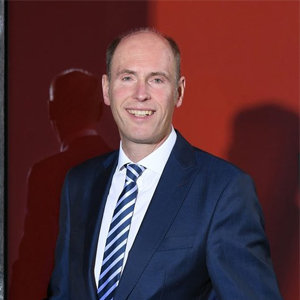
President, German Rectors’ Conference
Peter-André Alt was born in 1960. He studied German language and literature, political science, history, and philosophy at Freie Universität Berlin. Professor Alt has been a full professor of modern German literature since 1995, first at Ruhr-Universität Bochum (1995-2002), then at the University of Würzburg (2002-2005), and since 2005 at Freie Universität Berlin.From 2007 to 2009, Professor Alt served as the dean of the Department of Philosophy and Humanities at Freie Universität Berlin. From 2007 to 2010 he was a member of the Academic Senate and the spokesperson for the Friedrich Schlegel Graduate School of Literary Studies, for which Freie Universität raised funding in the German Excellence Initiative. From 2008 to 2010 he has been serving as director of Dahlem Research School. Professor Alt has been the president of Freie Universität Berlin for two terms, between May 2010 and July 2018. From 2014 to 2016 he was the chairperson of the German U15. In August 2018 he became president of the German Rectors’ Conference. Professor Alt has published numerous books on German literature of the 17th, 18th, and 20th centuries, including works on literary allegory in the early modern period, the Enlightenment, the literary and cultural history of dreams, Friedrich Schiller, Franz Kafka, and Sigmund Freud. In 2005 Professor Alt was awarded the Schiller Prize by the city of Marbach in recognition of his two-volume biography of Friedrich Schiller. In 2012, he was elected as president of the German Schiller Society. In 2008, he received a joint Opus Magnum grant from the Volkswagen and Thyssen Foundations for the completion of his book project on the Aesthetics of Evil. Professor Alt has served in several functions as member of international advisory boards and committees. Over the years he has given numerous keynote speeches and lectures on different topics (Literary Studies, Higher Education, Research Strategies and Policies, Governance) in Austria, Switzerland, Belgium, the Netherlands, Denmark, France, Italy, United Kingdom, Czech Republic, Poland, Russia, Turkey, United States, Peru, China, South Korea, Taiwan, and South Africa.
Daniel Armanios
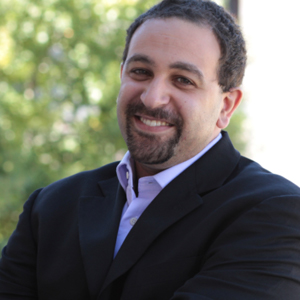
Assistant Professor in the Department of Engineering and Public Policy at Carnegie Mellon University
Daniel Armanios is an Assistant Professor in the Department of Engineering and Public Policy at Carnegie Mellon University as well as a Distinguished Visiting Professor of Leadership at Tsinghua University’s Schwarzman College. Armanios’ research lies at the intersection between engineering, institutions, and public policy. More specifically, he focuses on the local public institutions and infrastructure necessary to support high-tech innovation, sustainable development, and energy systems, with an emphasis on emerging and post-conflict countries such as China, India, Thailand, Egypt, and Tunisia. He received his PhD from Stanford University in Management Science & Engineering. He received two Master's degrees from the University of Oxford in Management Research and Water Science, Policy, and Management, and he received two Bachelor's degrees in Mechanical Engineering and Political Science from the University of Pittsburgh.
Janice L. Bailey
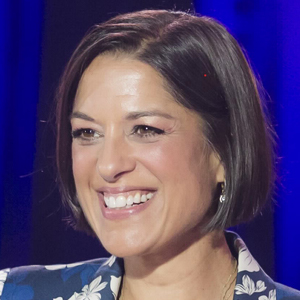
Scientific Director FRQNT
Janice Bailey is currently the Scientific Director of the Fonds de recherche du Québec - Nature and Technologies (FRQNT). The FRQNT mandate is to develop and promote research activities to address societal challenges and stimulate socio-economic development. In doing so, the FRQNT prioritises trainee support, interdisciplinary collaboration, research partnerships, and diversity in its approaches. Prior to joining the FRQNT, she was a professor of Animal Sciences & Research Associate Dean, Faculty of Agriculture & Food Sciences with an adjunct professorship in the Faculty of Medicine, Laval University (Québec City, Canada). As an active scientist for over 25 years, her research explored the impact of the environment, such as toxicant exposure, temperature and nutrition, on fertility, reproductive development and the ability to produce healthy offspring across multiple generations. She worked on a range of species, including bees, fish, agriculturally-important mammals, laboratory rodents and human studies. Professor Bailey has been Chair or member of many grant review panels, has served on the editorial boards of several journals, and has been involved in the organisation of numerous international congresses. Over her career, she has been elected to executive governance roles in various national and international scholarly societies. She has served numerous government advisory roles and on the governing boards of research groups. Professor Bailey has been recognized for her research contributions and leadership, and was recently appointed as a Distinguished Fellow of the Society for the Study of Reproduction.
Kumsal Bayazit
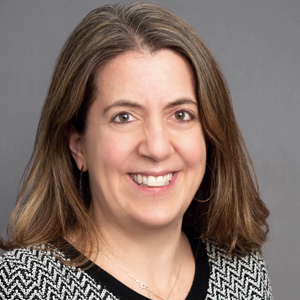
Chief Executive Officer of Elsevier
Kumsal Bayazit was appointed Chief Executive Officer of Elsevier in February 2019. She has held multiple leadership roles within RELX Group, Elsevier’s parent company, since 2004, including as Regional President Europe, Middle East and Africa at Reed Exhibitions and RELX’s Chief Strategy Officer, responsible for driving strategic initiatives and technology strategy. Prior to joining RELX Group, Kumsal spent several years at Bain & Company working in New York, Los Angeles, Johannesburg and Sydney. Kumsal is an advocate for the power of research and technology for driving positive societal outcomes, and champions inclusion and diversity. She chairs the RELX Technology Forum; co-chairs, along with Dr Richard Horton, Editor-in-Chief of The Lancet, Elsevier’s independent Inclusion & Diversity Board; and co-leads the Elsevier Foundation in its work to promote inclusive research and health in partnership with non-governmental and charitable organizations around the world, supporting the UN SDGs. Kumsal earned an MBA from Harvard Business School and is a graduate of the University of California at Berkeley where she received a Bachelor's degree in Economics with honors. Kumsal lives in London with her husband and two children.
Katja Becker
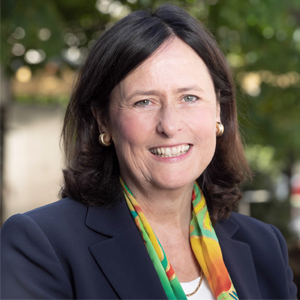
President of the Deutsche Forschungsgemeinschaft (DFG, German Research Foundation)
Katja Becker is the President of the Deutsche Forschungsgemeinschaft (DFG, German Research Foundation). She studied medicine at Heidelberg University, where she also obtained her doctoral degree and habilitation. After a position at the Center for Infectious Diseases, Würzburg University, she accepted a chair in Biochemistry and Molecular Biology at Giessen University. Education and research led her to Africa, Australia, Switzerland, the UK and the US. Her research interests focus on cellular redox metabolism as a drug target in malaria parasites and cancer cells. Until 2019 she was the coordinator of the DFG Priority Programme 1710, which examines the thiol-based regulation of enzymes, and spokesperson of the LOEWE Center DRUID, which aims to develop novel drugs, vaccines and diagnostics against neglected tropical diseases. Katja Becker is active in multiple scientific advisory boards and served as vice president at Giessen University. From 2014 to 2019, she was vice president of the DFG. Her work has been honoured with the Ludolf Krehl Prize, the Carus Medal, the Rudolf Leuckart Medal and membership in the German National Academy of Sciences Leopoldina. Since 2021, Katja Becker is also Chair of the Governing Board of the Global Research Council (GRC).
Matthias Beller
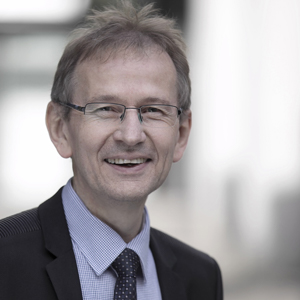
Vice President of the Leibniz Association
Matthias Beller, born 1962 in Gudensberg, studied chemistry at the University of Göttingen, Germany, where he completed his PhD thesis in 1989 in the group of L.-F. Tietze. As recipient of a Liebig scholarship, he then spent a one-year with K. B. Sharpless at MIT, USA. From1991 to 1995, Beller worked in industry.Then,he moved to the Technical University of München as Professor for Inorganic Chemistry. In 1998, he relocated to Rostock to head the Institute for Organic Catalysis, which became in 2006 the Leibniz-Institute for Catalysis. The work of his group has been published in >1000 original publications, reviews and >150 patent applications have been filed (H-index: 135).He has received a number of awards including the Otto-Roelen Medal and the Leibniz-Price of the DFG. In 2006, he was also awarded “Entrepreneur of the Year” of Rostock and he received the German Federal Cross of Merit. Since then, he received the first “European price for Sustainable Chemistry”, the “Paul-Rylander Award” of the Organic Reaction Catalysis Society of the USA, the Gay-Lussac-Alexander-von-Humboldt-Prize of the French Academy of Sciences and the Emil Fischer Medal of the German Chemical Society. In 2015, he was awarded an honorary doctoral degree from the University of Antwerp, Belgium and received the Wöhler price for Sustainable Chemistry from the German Chemical Society as well as an ERC Advanced grant from the European Commission. In March 2016, he received the honorary doctorate of the University of Rennes 1.In 2017, Matthias Beller has received the Karl Ziegler Prize from GDCh, (German Chemical Society) and the Karl Ziegler Foundation - the award is one of the highest honors in the f ield of chemistry in Germany – and he was awarded as the first European chemist with the ACS Catalysis Award Lectureship. Most recently, he was selected as the prestigious “Hassel Lecturer 2018” from the University of Oslo, Norway and for the “Gordon Stone Lectureship” of the University of Bristol, UK. Matthias Beller is Vice President of the Leibniz Society – one of the major science organizations in Germany and a member of the German National Academia of Science “Leopoldina” and three other Academies of Sciences.
Michela Bello
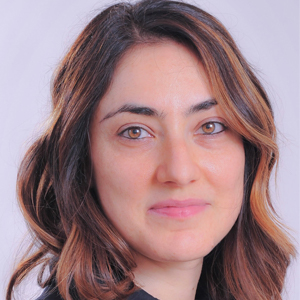
Analyst in the OECD Directorate for Science, Technology and Innovation
Michela Bello is an analyst in the OECD Directorate for Science, Technology and Innovation. She is responsible for the publication of business innovation statistics following the OECD/Eurostat Oslo Manual guidelines and is charge of a global study of researchers providing evidence in various science policy areas. Prior to joining the OECD, she worked as a consultant in UNIDO where she contributed to research projects on the impact of foreign direct investment in developing countries and the measurement of innovation and productivity. She holds an MSc in Economics from Bocconi University and is currently studying for a PhD at the Science Policy Research Unit, University of Sussex.
Frazier Benya

Senior Program Officer at the National Academies of Sciences, Engineering, and Medicine, and director of the Action Collaborative on Preventing Sexual Harassment in Higher Education
Dr. Frazier Benya is a Senior Program Officer at the National Academies of Sciences, Engineering, and Medicine, and currently the director of the Action Collaborative on Preventing Sexual Harassment in Higher Education – a group of over 60 academic and research institutions and key stakeholders that are working to identify, research, develop, and implement efforts that move beyond basic legal compliance to evidence-based policies and practices for addressing and preventing all forms of sexual harassment and promoting a campus climate of civility and respect. Dr. Benya’s work focuses on ensuring that science, engineering, and medicine are ethical and socially responsible, both in their practice and in who gets to participate in the work. From 2016 to 2019 she served as the study director for the National Academies consensus study report Sexual Harassment of Women: Climate, Culture, and Consequences in Academic Sciences, Engineering, and Medicine, which was initiated by the National Academies’ Committee on Women in Science, Engineering, and Medicine. Between 2011 and 2017, Dr. Benya worked with the National Academy of Engineering (NAE) to manage projects focused on improving and enhancing engineering ethics education and on analyzing the pathways engineers take from education to the workforce. Dr. Benya holds a B.A with honors in Science, Technology and Society from the University of Puget Sound, and a M.A. in Bioethics and Ph.D. in History of Science, Technology, and Medicine from the University of Minnesota. Dr. Benya was elected a Fellow of the American Association for the Advancement of Sciences in 2017.
Stephane Berghmans

EUA Director of Research and Innovation
Stephane Berghmans is the EUA Director of Research and Innovation. He joined the Association in 2020 after working for Elsevier since 2013 as Vice President of Academic Relations in Brussels, responsible for strategic relationships and partnerships with research organisations and EU institutions. Prior to this, Stephane worked for the European Science Foundation as Head of the Biomedical Sciences Unit, managing the secretariat general for the European Medical Research Councils (EMRC) with activities in science management, policy and strategy. He is a Doctor in Veterinary Medicine who obtained his PhD in genetics and molecular biology at the University of Liege (Belgium). Stephane was a postdoctoral fellow at Harvard Medical School, worked in the biotech sector in Cambridge (UK) and served as Director of Biology at Znomics in Portland, Oregon (USA). Since 2015, Stephane is a member of the EuroScience Governing Board.
Thomas Berghöfer

Senior Scientist
Dr. T. W. Berghöfer studied Physics and Astrophysics in Marburg, Bochum, and received a PhD in Munich. He won a Humboldt fellowship to work at the Space Sciences Lab at UC Berkeley. During his active research career, he was working in X-ray and EUV astronomy at the Max Planck Institute for extraterrestrial Physics, UC Berkeley, and University of Hamburg. While working at the University of Hamburg he was appointed as one of the women’s representatives in the faculty of physics. He holds a degree in higher education didactics and e-learning methods from the University of Hamburg. Later he became a science programme manager in the German research funding system of the federal government. He has coordinated several larger European consortia on research funding, R&D, and gender in physics. Thomas Berghöfer is currently the coordinator of GENERA Network.
Marcelis Johannes Boereboom
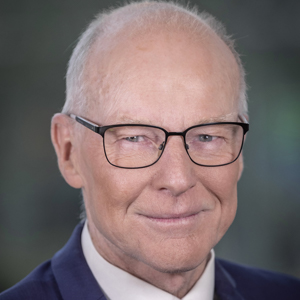
Director-General for Higher and Vocational Education, Science and Emancipation at the Ministry of Education, Culture and Science
Marcelis Johannes Boereboom studied Political Science at the ‘Vrije Universiteit’ in Amsterdam. He specialized in Public Administration and Public Finance. In 1984 he started at the Ministry of Health, Welfare and Sport, where he has had several positions. From 2000 until 2004 he was Director of the Directorate for Financial and Economic Affairs. From 2004 until 2008 he was Director of the Directorate for Curative Care and Deputy Director-General for Health Care. From 2008 until September 2013 he was Director-General for Long Term Care. In these positions he was closely involved with and responsible for the Dutch health care reform. From September 2013 until he holds the position of Director-General for Employment at the Ministry of Social Affairs and Employment. He is responsible for policy in the areas of employment, labour conditions, industrial relations, labour law, childcare, pensions and occupational safety and health. In this position he is responsible for the reform of the Dutch labour market and the reform of the Dutch pension system. From April until September 2016 he was also acting Secretary-General at the Ministry of Social Affairs and Employment. Since April 2017 he holds the position of Director-General for Higher and Vocational Education, Science and Emancipation at the Ministry of Education, Culture and Science.
Lidia Borrell-Damián
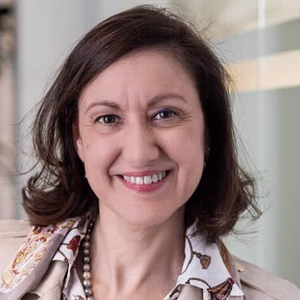
Secretary General of Science Europe
Lidia Borrell-Damián is the Secretary General of Science Europe, the association representing major public organisations that fund or perform excellent, ground-breaking research in Europe. She holds overall responsibility for the strategy and functioning of the organisation. Prior to this she worked for the European University Association (EUA) between 2006 and 2014. During the last five years in EUA she served as its Director for Research and Innovation (R&I), holding responsible for the overall strategy and activities of EUA in the area, working with EUA individual universities as well as the National Rectors’ Conferences. Her areas of experience cover a wide range of EU R&I priorities, including the EU Framework Programme; European Research Area; research infrastructures; research ethics and integrity; research assessment processes; university-business cooperation; regional innovation; gender issues in research; Digital Agenda and Open Science. She also worked on doctoral education through the EUA-Council for Doctoral Education (EUA-CDE) and coordinated scientific policy input to the European Strategic Energy Technology Plan (SET-Plan) through the European Platform of Universities in Energy (EUA-EPUE). Lidia Borrell-Damian holds a Doctorate in Chemistry (Chemical Engineering Specialty; Solar Energy) from the University of Barcelona. Prior to joining EUA, she was Director of Research at Universitat Pompeu Fabra in Barcelona from 2003-2005. Before then she was Visiting Scholar at the University of Western Ontario (1999-2001) and at the North Carolina State University (1997-1998).
Niall Boyce
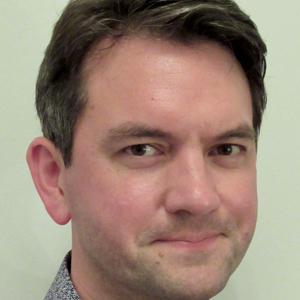
Senior Editor, The Lancet
Dr Niall Boyce joined The Lancet as a Senior Editor in 2010, and is founding Editor of The Lancet Psychiatry. Niall trained in medicine at Oxford University and subsequently on the University College London psychiatry rotation. His interests include suicide research, trauma, old age psychiatry, and social and transcultural aspects of mental health.
Claudia Canali
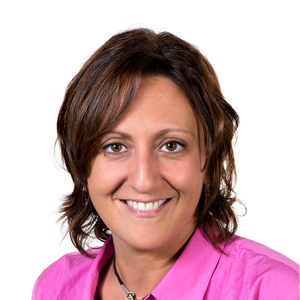
Associate professor at the Department of Engineering 'Enzo Ferrari' of the University of Modena and Reggio Emilia
After a master degree in Information Engineering in 2002 and a PhD degree in Information Technologies in 2006, Claudia Canali is currently an associate professor at the Department of Engineering 'Enzo Ferrari' of the University of Modena and Reggio Emilia. Her main research interests focus on cloud and edge computing, high performance distributed systems, social network analysis and gender equality in ICT: in these fields she published more than 70 papers in international conferences and journals. Claudia Canali has taken part to several research projects at international level: she was scientific responsible for UNIMORE of Horizon 2020 Project EQUAL-IST "Gender Equality Plans for Information Sciences and Technology Research Institutions" (2016-2019) and is currently a member of Horizon 2020 Project LeTSGEPs "Leading Towards Sustainable Gender Equality Plan in research institutions" (2020-2023). Moreover, she is one of the organizers of the summer camp 'Ragazze Digitali', now at the seventh edition, aimed at attracting more female students towards ICT-related studies.
Isabelle Caron
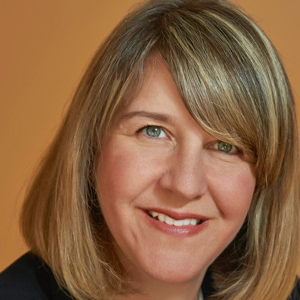
Professor at the School of Public Administration at Dalhousie University
Isabelle Caron is a Professor at the School of Public Administration at Dalhousie University. She holds a Ph.D. in Public Administration from the University of Ottawa. Her research focuses on diversity, intersectionality, control, performance and integrity in the public sector. From 1999 to 2012, she worked at the Privy Council Office, the Treasury Board Secretariat of Canada, Health Canada and Canadian Heritage as a senior policy analyst.
Janine Austin Clayton

NIH Associate Director for Research on Women’s Health Director, NIH Office of Research on Women’s Health
Janine Austin Clayton, M.D., Associate Director for Research on Women’s Health and Director of the Office of Research on Women’s Health (ORWH) at the National Institutes of Health (NIH), is the architect of the NIH policy requiring scientists to consider sex as a biological variable across the research spectrum. This policy is part of NIH’s initiative to enhance reproducibility through rigor and transparency. As co-chair of the NIH Working Group on Women in Biomedical Careers with NIH Director Dr. Francis Collins, Dr. Clayton also leads NIH’s efforts to advance women in science careers. Prior to joining the ORWH, Dr. Clayton was the Deputy Clinical Director of the National Eye Institute (NEI) for seven years. A board-certified ophthalmologist, Dr. Clayton’s research interests include autoimmune ocular diseases and the role of sex and gender in health and disease. She is the author of more than 80 scientific publications, journal articles, and book chapters. Dr. Clayton, a native Washingtonian, received her undergraduate degree with honors from Johns Hopkins University and her medical degree from Howard University College of Medicine. She completed a residency in ophthalmology at the Medical College of Virginia. Dr. Clayton completed fellowship training in cornea and external disease at the Wilmer Eye Institute at Johns Hopkins Hospital and in uveitis and ocular immunology at NEI. Dr. Clayton has received numerous awards, including the Senior Achievement Award from the Board of Trustees of the American Academy of Ophthalmology in 2008 and the European Uveitis Patient Interest Association Clinical Uveitis Research Award in 2010. She was selected as a 2010 Silver Fellow by the Association for Research in Vision and Ophthalmology. In 2015, she was awarded the American Medical Women’s Association Lila A. Wallis Women’s Health Award and the Wenger Award for Excellence in Public Service. Dr. Clayton was granted the Bernadine Healy Award for Visionary Leadership in Women’s Health in 2016. She was also selected as an honoree for the Woman’s Day Red Dress Awards and the American Medical Association’s Dr. Nathan Davis Awards for Outstanding Government Service in 2017.
Fabio Conforti
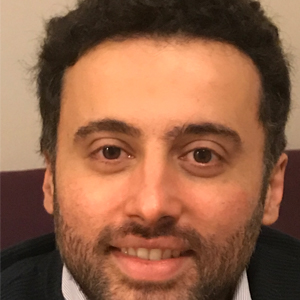
Medical oncologist at Medical Oncology Unit of Melanoma, Sarcoma, Thymoma and Rare Tumors - European Institute of Oncology, Milan, Italy
Fabio Conforti is medical investigator oncologist at the European Institute of Oncology, Milan, Italy. He specializes in the management of patients affected by rare tumors; preclinical translational research mainly focused on the characterization of antitumor activity; and clinical research focused on the interaction between patients’ sex and effectiveness of anticancer immunotherapies. He is Member of Scientific Review Board, which reviews all academic or sponsored clinical trials for scientific quality and correct study design.
Rhonda Davis

Head of the Office of Diversity and Inclusion (ODI) in the Office of the Director at the National Science Foundation (NSF)
Rhonda Davis is Head of the Office of Diversity and Inclusion (ODI) in the Office of the Director at the National Science Foundation (NSF) where she is responsible for ensuring NSF’s commitment to a diverse, inclusive, and discrimination-free environment for employees, beneficiaries and applicants for employment or services. NSF funds reach annually all 50 states through grants to nearly 2,000 colleges, universities and other institutions from more than 50,000 competitive proposals that result in about 12,000 new funding awards. Her efforts resulted in NSF being a trailblazer as one of the first federal agencies that require institutions it funds to notify the agency of any findings or determinations that an NSF-funded principal investigator or co-principal investigator committed harassment (including sexual harassment or sexual assault) or placed on administrative leave or imposition of administrative action relating to harassment or sexual assault finding or investigation. Her work in this area has resulted in her testifying before Congress, serving on numerous panels both nationally and globally, including an embassy. Davis joined NSF in 2010 from the United States Department of Agriculture’s Office of the Assistant Secretary for Civil Rights where she served in several positions including Acting Associate Assistant Secretary for Civil Rights. Her experience in establishing and managing nondiscrimination and diversity programs has enabled her to significantly contribute to NSF’s very important goal to excel as a federal science agency with a diverse, engaged, and high-performing workforce.
Jonathan Dawes
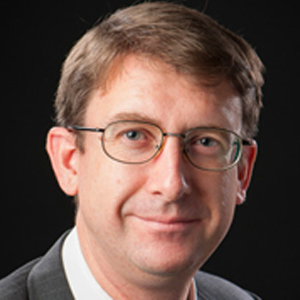
Professor of Applied Mathematics, University of Bath, UK
Jonathan Dawes is Professor of Applied Mathematics at the University of Bath, UK. His research spans mathematical modelling in a broad sense and involves research partners from British Telecom to UNICEF. From 2015 – 2020 he was Director of Bath’s Institute for Mathematical Innovation (IMI), which cultivates novel collaborations between mathematicians and natural and social scientists. He currently chairs the UK Engineering and Physical Sciences Research Council’s (EPSRC) Strategic Advisory Team for the Mathematical Sciences, and is a member of EPSRC’s Strategic Advisory Network and the Advisory Board for the Royal Academy of Engineering’s Safer Complex Systems Programme.
Holly J. Falk-Krzesinski
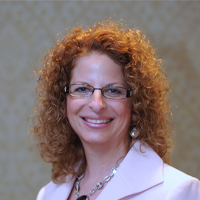
Vice President, Research Intelligence on the Global Strategic Networks team at Elsevier.
Holly J. Falk-Krzesinski, PhD, is the Vice President, Research Intelligence on the Global Strategic Networks team at Elsevier. Her key role is building and maintaining long term relationships with research institutions and funders, giving voice to research leaders at those organizations within Elsevier to help the business deliver the most impactful solutions to support research globally. Dr. Falk-Krzesinski focuses on how insights from data and analytics guide strategic planning for research institutions, funders, and science policy organizations and her engagement activities include building partnerships around gender diversity and equity issues. Actively involved in promoting women leaders in STEM, Dr. Falk-Krzesinski is co-chair of the Gender Working Group at Elsevier and co-author on Elsevier’s two global gender reports. She also previously served as the editor-in-chief of the AWIS Magazine. Prior to joining Elsevier, Holly was a faculty member and administrator at Northwestern University. Notably, there she launched the Chicago Collaboration for Women in STEM and the Navigating the Professoriate and Beyond Tenure programs in support of career advancement for women faculty members in STEM fields.
Roland A. Fischer
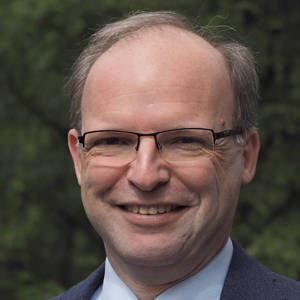
Chair of Inorganic and Metal-Organic Chemistry at the Technical University of Munich (TUM) and is Director of the TUM Catalysis Research Centre (CRC)
Roland A. Fischer, Prof. Dr. rer. nat., Dr. phil. h.c., holds the Chair of Inorganic and Metal-Organic Chemistry at the Technical University of Munich (TUM) and is Director of the TUM Catalysis Research Centre (CRC). Previously he was Professor of Inorganic Chemistry at the Ruhr-University Bochum (1997-2015) and the Ruprecht Karl University of Heidelberg (1996-1997). He has been elected Vice-President of the German Research Foundation (DFG) in 2016. He is member of the Award Selection Committee of the Alexander von Humboldt-Foundation (AvH), member of the Scientific Advisory Board of the Association of the German Chemical Industry Fund (FCI) and elected member of the European Academy of Sciences (EURASC). His research interest focuses on functional molecular materials for advanced applications in energy conversion, catalysis, gas storage and separation, chemical sensing, photonics and microelectronics.
Heike Graßmann
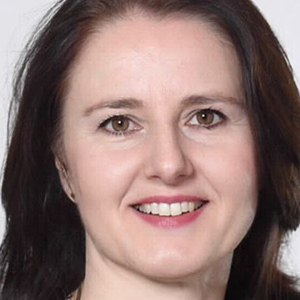
Administrative Director of the Max Delbrück Center for Molecular Medicine in the Helmholtz Association (MDC)
Since 01.10.2018 Professor Dr. Heike Graßmann has been Administrative Director of the Max Delbrück Center for Molecular Medicine in the Helmholtz Association (MDC) and is responsible for the areas of Finance, Human Resources, Legal Affairs and Infrastructure. For the last 4 years she has also been the Administrative Vice-President of the Helmholtz Association. She has been a strong advocate for talent management and diversity for many years. She is available as a mentor for young women in various programmes. Heike Graßmann studied Business Administration at the Martin-Luther-University Halle-Wittenberg, where she also worked as a research assistant. She initially worked for several years as a personal consultant to the management at the Helmholtz Centre for Environmental Research (UFZ) in Leipzig and to the Chancellor of the University of Leipzig before heading the finance department of the UFZ and later on as Administrative Director from 2012 to September 2018. Since 2015, she has been deputy chairwoman of the University Council of the Leipzig University of Applied Sciences (HTWK). Since October 2015, she has also held an honorary professorship at the Leipzig State Academy of Studies of the Saxony University of Cooperative Education.
Jadranka Gvozdanović
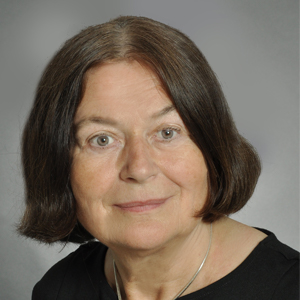
Linguistics professor at Heidelberg University and a gender expert
Jadranka Gvozdanović is a linguistics professor at Heidelberg University and a gender expert. In both fields, her research focuses on change processes, on how and why change begins and which factors contribute to adoption of change or resistance to it. Concerning gender, she focuses on modification of structural factors involving all the levels of an institution, and the importance of communication. She holds leading positions in scholarly associations and is currently Chair of the LERU Group on Equality, Diversity and Inclusion. Within LERU, she contributed to position statements about gender equality and (co-)authored the following papers: “The European Research Area: Priorities for Research Universities (2011), “Women, research and universities: excellence without gender bias” (2012) , “Implicit bias in academia: A challenge to the meritocratic principle and to women’s careers – and what to do about it”.
Christina Hadulla-Kuhlmann
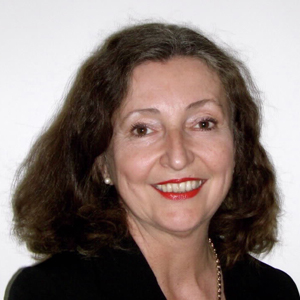
Head of Division for Equal Opportunities and Diversity in Academia and Research at BMBF
Christina Hadulla-Kuhlmann worked as a lawyer before becoming Deputy Head of the Legal Affairs Division in 1992 and subsequently Deputy Head of the Human Resources Division at the then Federal Ministry of Education and Science (now the Federal Ministry of Education and Research, BMBF). She has been Head of Division for Equal Opportunities and Diversity in Academia and Research at the ministry since 2001. In this capacity, she is co-chair of the gender equality working group of Germany’s Joint Science Conference (GWK). She is also a member of the D-A-CH group (for the exchange of information on equal opportunities measures in higher education and research in German-speaking regions, represented by the science ministries of Austria, Switzerland and Germany). She also represents the Federal Government in the ERAC Standing Working Group on Gender in Research and Innovation (Helsinki Group), which prepares expert reports on the further development of equal opportunities for women in the science system.
Ira Harkavy
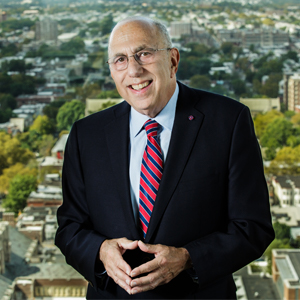
Associate Vice President and Founding Director of the Barbara and Edward Netter Center for Community Partnerships, University of Pennsylvania
Ira Harkavy is Associate Vice President and Founding Director of the Barbara and Edward Netter Center for Community Partnerships, University of Pennsylvania, where he teaches in the departments of History, Urban Studies, and Africana Studies, and in the Graduate School of Education. His recent books include Higher Education’s Response to the COVID-19 Pandemic: Building a More Sustainable and Democratic Future (2021), Academic Freedom, Institutional Autonomy and the Future of Democracy (2020), The Local Mission of Higher Education: Principles and Practice (2019), Higher Education for Diversity, Social Inclusion and Community: A Democratic Imperative (2018), and Knowledge for Social Change: Bacon, Dewey, and the Revolutionary Transformation of Research Universities in the Twenty-First Century (2017). Harkavy chairs the International Consortium for Higher Education, Civic Responsibility and Democracy and the Anchor Institutions Task Force.
Gerald Haug
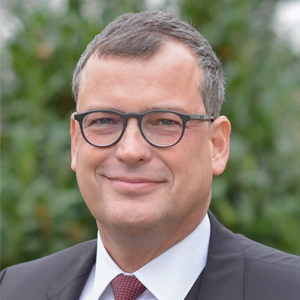
President of the German National Academy of Sciences Leopoldina
Gerald Haug is a climatologist, geologist and paleo-oceanographer. Since March 2020, he is president of the German National Academy of Sciences Leopoldina. Gerald Haug studied Geology at the University of Karlsruhe and received his PhD from the University of Kiel. After pursuing his postdoctoral research at the University of British Columbia in Vancouver, the Woods Hole Oceanographic Institution in Massachusetts and the University of Southern California in Los Angeles, he became a researcher at the Swiss Federal Institute of Technology Zurich (ETHZ) and habilitated there. Haug then moved to the German Research Centre for Geosciences (GFZ) in Potsdam and was appointed professor at the University of Potsdam. In 2007, he became full professor at ETHZ and in 2015 Director at the Max Planck Institute for Chemistry in Mainz. He studies the evolution of climate over the last millennia to millions of years. To do this, he examines sediment cores that are bored out of the bottom of oceans and lakes. The chemical composition of the various sedimentary layers provides information about climatic conditions of the time in which the respective layer was deposited. Thus, Gerald Haug reconstructed historical climatic conditions and their changes. He also explores the interactions between climate and cultures. From studies of sediment cores off the coast of Venezuela, he succeeded in providing historical periods of drought which correlated with the decline of Maya civilization. Photo Credit: "Markus Scholz for the Leopoldina"
Philipp Heß
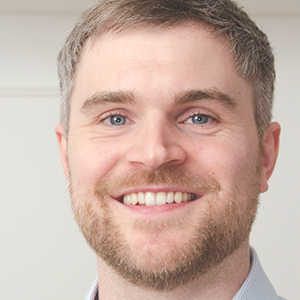
Scientific Director, German Standardization Panel, Chair of Innovation Economics, Technical University Berlin
Philipp Heß is scientific director of the German Standardization Panel (a yearly survey on the standardization activites of companies), and PhD candidate at the Chair of Innovation Economics, TU Berlin. His research interests lie in the field of innovation, standardization and sustainability. Before that, he worked as a consultant in the ICT sector. Philipp studied at Chalmers University of Technology, Gothenburg and at TU Berlin, and holds a Master’s degree in Industrial Engineering.
Rudolf Hielscher
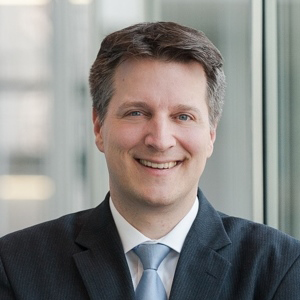
Head of acatech Brussels office
Rudolf Hielscher started his professional career working for members of the German Parliament (Deutscher Bundestag). After different career steps in the field of politics, he worked for five years as Head of Staff of the Minister of Innovation, Professor Andreas Pinkwart, in North Rhine-Westphalia, Germany. After that he was Head of Division for European Affairs and Policy in the Ministry of Innovation, Research, Science and Technology, NRW. In September 2011 he opened acatech’s Brussels office and acts as its head since today. In 2016 he became the Coordinator of the Horizon 2020 project SAPEA (Science Advice for Policy by European Academies) which brings together expertise in engineering, humanities, medicine, natural and social sciences from over 100 academies of sciences from more than 40 countries in Europe. SAPEA is part of the Scientific Advice Mechanism of the European Commission.
Katharina Hochfeld
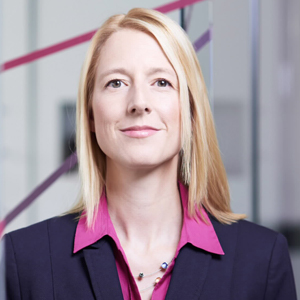
Deputy director of the Center for Responsible Research and Innovation (CeRRI) at Fraunhofer IAO
Katharina Hochfeld is deputy director of the Center for Responsible Research and Innovation (CeRRI) at Fraunhofer IAO. She also heads the "Corporate Culture and Transformation" team there. Together with her team, she works on research and implementation projects to shape transformation and innovation processes responsibly. Her work focuses on researching and supporting gender-equitable organisational development. She has led research and consulting projects in this field for the Evangelical Church in Germany, the German Federal Film Board and the German Federal Foreign Office. Before joining Fraunhofer, she worked in political consulting and studied political science, intercultural business communication and social psychology in Jena and Olomouc.
Ferenc Huszár
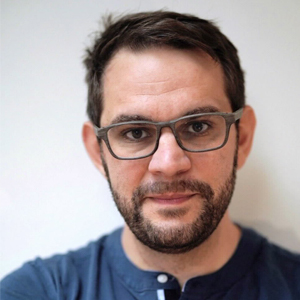
Senior Lecturer of Computer Science at Cambridge University
Ferenc Huszár is Senior Lecturer of Computer Science at Cambridge University. He finished his PhD in Machine Learning in 2012 at the Engineering Department in Cambridge. Since then, he has held several positions in startups, venture capital and technology companies. He served as Principal Research Scientist of AI startup Magic Pony Technology, which was acquired by Twitter in 2016. Between 2016 and 2020 Ferenc worked as a Senior Machine Learning Researcher at Twitter, where, among other things he worked on fairness and bias in algorithmic decision-making systems. He is currently an academic advisor working with Twitter's Machine Learning Ethics, Transparency and Accountability (META) team. At Cambridge, he focusses on theoretical machine learning aimed at better understanding deep learning and increasing the robustness of AI techniques.
Jonathan Jansen
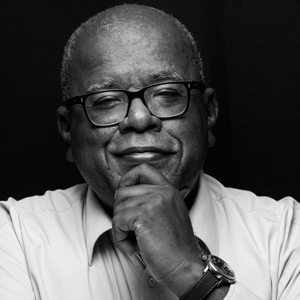
Distinguished Professor of Education at Stellenbosch University and President of the Academy of Science of South Africa
Jonathan Jansen is Distinguished Professor of Education at Stellenbosch University and President of the Academy of Science of South Africa. He is a curriculum theorist, and his research is concerned with the politics of knowledge. His 2019/2020 books (co-authored, co-edited) include South African Schooling: The enigma of inequality, Fault lines: a primer on race, science and society, Who gets in and why: the politics of admission in South Africa’s elite schools, Learning under lockdown: voices of South Africa’s children, and Learning Lessons. His current research includes a national study on the impact of the pandemic on the academic work of women scholars. He holds a PhD (Stanford) and five honorary degrees in education.
Daphna Joel
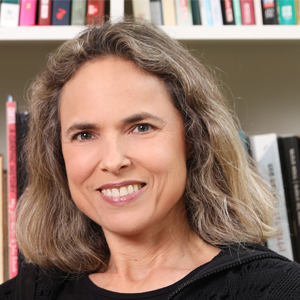
Professor of Neuroscience and Psychology, at the School of Psychological Sciences and the Sagol School of Neuroscience at Tel-Aviv University.
Daphna Joel is a professor of Neuroscience and Psychology, at the School of Psychological Sciences and the Sagol School of Neuroscience at Tel-Aviv University. She studies questions related to brain, sex and gender. In a series of papers she has described and tested the ‘mosaic’ hypothesis – the claim that sex differences in the brain do not add-up consistently in individuals; rather, most brains are composed of both features more common in females and features more common in males. Other studies focused on the perception of gender identity and its relation to sexuality. Ongoing studies attempt to characterize the relations between sex and brain structure and function. She is also the author of Gender Mosaic: Beyond the Myth of the Male and Female Brain (Octopus, London; DTV, Munich).
Oliver Johnson
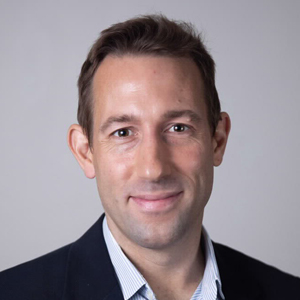
Head of Climate, Energy and Environment at the UK Government Office for Science
Oliver Johnson is Head of Climate, Energy and Environment at the UK Government Office for Science. Oliver has over 12 years’ experience in energy, climate change and international development, focusing on energy governance, energy access, low-carbon innovation and industry decarbonization. He has worked across Europe, Africa and Asia for a diverse range of organisations, including international organisations, national governments, community-based NGOs, development policy think tanks and academic institutions. Oliver's research interests lie in understanding complexities associated with transitioning to more sustainable energy systems and how different actors seek to shape and frame the process. In particular, he is concerned with how new technologies and services are diffused within society and how to address deeper barriers to diffusion associated with technologies, infrastructures, markets, government policies and regulation, user practices, social norms and cultural meaning. This has led to recent work exploring gender and social equity aspects of energy transitions, through a systematic review of the literature and in-depth research in Kenya and Zambia.
Terence Karran
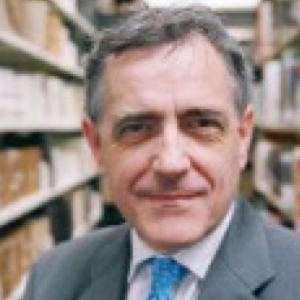
Professor of Higher Education Policy in the School of Education at the University of Lincoln,UK
Terence Karran is Professor of Higher Education Policy in the School of Education at the University of Lincoln in the UK. He is also a Docent Professor in Educational Technology in the Faculty of Education at Oulu University in Finland. From 2005-07, he worked as a Visiting Professor at the Universidad Autónoma de Guadalajara in Mexico, where he was Director of the UAG’s Distance Learning Centre and also the Mexican National Co-Ordinator of the World Bank Institute’s Global Development Learning Network for Latin America and the Caribbean. His more recent work has looked at academic freedom in Europe and Africa, funded through two EU Marie Curie Fellowships. In 2017, he undertook a study of academic freedom in the UK for the University and College Union, which was the basis for an ongoing appeal by the UCU to UNESCO that legislation in the UK does not protect academic freedom sufficiently. In 2019, he was commissioned to draft an Expert Report on “Threats to academic freedom and autonomy of universities in Europe”, for the Council of Europe’s Committee on Culture, Science, Education and Media, which was a major contribution to the development of a new policy initiative by the Council to create a new convention on academic freedom.
Professor Anke Kaysser-Pyzalla
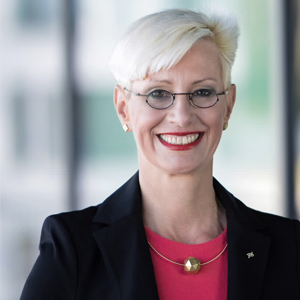
Chair of the Executive Board at the German Aerospace Center (Deutsches Zentrum für Luft- und Raumfahrt; DLR)
Professor Anke Kaysser-Pyzalla has been Chair of the Executive Board at the German Aerospace Center (Deutsches Zentrum für Luft- und Raumfahrt; DLR) since 1 October 2020. She completed her doctorate and habilitation at Ruhr-Universität Bochum. Following research activities at the Hahn-Meitner-Institut (HMI) and at the Technische Universität Berlin, she taught and conducted research as a professor at the Technische Universität Wien (Vienna University of Technology) from 2003 to 2005. In 2005, she joined the management team at the Max-Planck-Institut für Eisenforschung GmbH (Max Planck Institute for Iron Research) in Düsseldorf as a Scientific Member, Director and member of the Executive Board. In 2008, she was appointed the Scientific Director of the Helmholtz-Zentrum Berlin für Materialien und Energie GmbH (Helmholtz Centre for Materials and Energy), which was created under her leadership through the merger of HMI and the Berlin Electron Storage Ring Company for Synchrotron Radiation (Berliner Elektronenspeicherring-Gesellschaft für Synchrotronstrahlung mbH; BESSY). From May 2017 until taking up her post at DLR, Anke Kaysser-Pyzalla served as President of the Technische Universität Braunschweig.
Eun Mee Kim
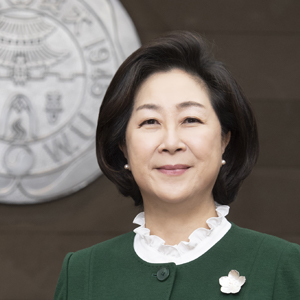
Professor, Graduate School of International Studies; Director, Ewha Global Health Institute for Girls & Women;Ewha Womans University
Professor Eun Mee Kim is the 17th President of Ewha Womans University. She is Professor in the Graduate School of International Studies, Director of the Ewha Global Health Institute for Girls and Women, former Dean of the Graduate School, former Dean of the Graduate School of International Studies, and former Director of the Institute for Development and Human Security at Ewha Womans University. She was appointed by the UN Secretary General in December 2016 to serve as one of the fifteen Independent Group of Scientists to work on the Global Sustainable Development Report 2019, which was presented to the UN Secretary General and heads of member states at the UN General Assembly in September 2019. She served as President of the Korea Association of International Development and Cooperation (2011, 2012). She served on the Committee for International Development Cooperation under the Prime Minister’s Office, the Policy Advisory Committee for the Ministry of Foreign Affairs, and the Ministry of Gender Equality and Family. In 2012, she received the Service Merit Medal from the Republic of Korea for her contributions to the Fourth High-Level Forum on Aid Effectiveness in Busan. In 2013, she received the first research grant to a university in South Korea from the Bill & Melinda Gates Foundation on her research, “Advocacy for Korean Engagement in Global Health and Development.” In 2016, and again in 2019, she received a research grant from the Bill & Melinda Gates Foundation for “Korea Global Health Strategy.”
Katrin Kinzelbach
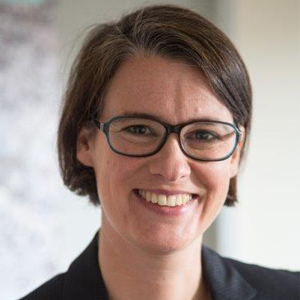
Professor of political science at FAU Erlangen-Nürnberg
Katrin Kinzelbach is a professor of political science at FAU Erlangen-Nürnberg, where she teaches the international politics of human rights. Before joining FAU, Kinzelbach was associate director of the Global Public Policy Institute in Berlin and a visiting professor at the Central European University in Budapest. She initiated the Academic Freedom Index and edited a book on Researching Academic Freedom (open access with FAU University Press).
Ineke Klinge
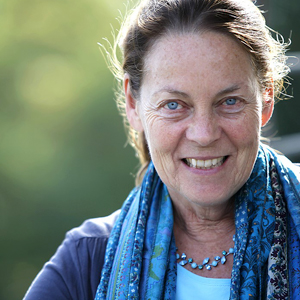
Ineke Klinge was Rapporteur for the EU funded Expert Group Gendered Innovations 2 which produced the policy Report Gendered Innovations 2 : How inclusive analysis contributes to Research and Innovation (2020), as a preparation for the new Horizon Europe funding programme (2021-2017). Her longstanding involvement with EU research policy is demonstrated from chairing the Horizon 2020 Advisory Group on Gender at the European Commission (2014-2018) and being the Rapporteur as well of the first edition of Gendered Innovations, developed together with Londa Schiebinger from Stanford University (2011-2013). Ineke Klinge held positions as professor of Gender Medicine at the University of Göttingen (2008-2009) and Charité Universitätsmedizin, Berlin (2015) and a associate professor of Gender Medicine at Maastricht University (until 2014). Her background lies in biomedical sciences and gender research and her work has focused on innovation of methodologies for biomedical and health research. Since 2000 she has coordinated many EU funded projects and was a pioneer in raising awareness for integration of sex and gender in research and innovation in EU framework programmes. She contributed in providing tools for the research community to take account of sex and gender (GenderBasic project, Special volume: Bringing gender expertise to biomedical and health research). Her book Sex and Gender in Biomedicine. Theories, Methodologies, Results was published in 2010 (University press Göttingen). She was board member of the European Institute of Women’s Health for 20 years and currently serves on the advisory board of the Canadian Institute for Gender and Health (IGH) and a number of EU projects. In her own country she was a member of the Dutch Alliance for Gender & Health that developed a research programme focusing on integration of sex and gender analysis in health research and -care. This programme received a 4-years funding from the Dutch Ministry of Health, Well-being and Sports in 2016 and she is a member of the programme committee. In October 2017 the Alliance for Gender & Health was transformed into the Dutch Society for Gender & Health of which she is the first president.
Agnes Kügler
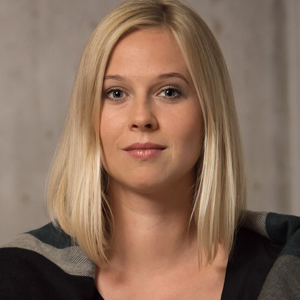
Research staff member at the Austrian Institute of Economic Research (WIFO)
Agnes Kügler is a research staff member at the Austrian Institute of Economic Research (WIFO) in Vienna since 2015. She holds a master's degree in economics from the Vienna University of Economics (WU Wien), a Master of Science from the Institute for Advances Studies (IHS) and the Vienna University of Technology (TU Wien) and a doctoral degree from the Vienna University of Economics (WU Wien). Her main research interests are industrial organization and innovation economics. Agnes has been working on various national and international research projects focusing on structural change, competitiveness, digitalization and innovation and research systems. She is responsible for the WIFO Research Seminar, teaches applied microeconomics at the WU Wien and is deputy member of the Austrian Competition Commission.
Alexander Kurz
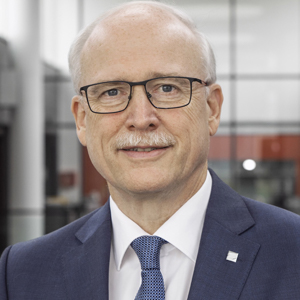
Senior Vice President for Human Resources, Legal Affairs and IP Management at the Fraunhofer-Gesellschaft
PROF. DR. RER. PUBL. ASS. IUR. Alexander Kurz is executive vice president for human re- sources, legal affairs and IP management at the Fraunhofer-Gesellschaft in Munich since 2011 and is deputy chair of the Center for Research Management (ZWM) in Speyer. Prof. Kurz was born in 1961 and studied law in Regensburg and Tübingen. After a legal internship in Tübingen, he passed the second state law examination and afterwards completed his doctorate on a part-time basis at the German University of Administrative Sciences Speyer. From 1989 to 2000, Alexander Kurz subsequently held various positions at the Karlsruhe Re- search Center, latterly as head of human resources and social affairs. He then moved to the European Organization for Nuclear Research (CERN) in Geneva, where he was head of in- dustrial services management and deputy head of the supplies procurement and logistics division until 2005. From 2005 to 2007, he was administrative director at GSI and, in this capacity, was head of administration during establishment of the FAIR project. In December 2007, he moved back to the Karlsruhe Research Center to take up the position of administ- rative director and deputy chair of the management board. Following the establishment of the Karlsruhe Institute of Technology, Alexander Kurz was appointed vice president for bu- siness affairs and finance and acting vice president for human resources.
Heisook Lee

President of Center of Gendered Innovations for Science & Technology Research (GISTeR) and Professor Emeritus of Ewha Womans University, Republic of Korea
Heisook Lee, the President of GISTeR established to contribute to national science and technology innovation by maximizing inclusive research and innovation for both men and women by integrating gender dimension in R&D. Having co-organized both Gender Summit Asia Pacific in 2015 and Gender Summit Global for SDGs in 2020 held in Seoul, Korea, she has devoted her career to empowering women and girls in the STEM fields since 1980 as a professor of Mathematics, Ewha Womans university and as the founding president of Center of WISET (Women in Science, Engineering and Technology). The first Returnee Program for career interrupted Women and mentoring program for female students in STEM of WISET have developed to national HRD programs for women in STEM. Professor Lee’s current interests include gender and artificial intelligence (AI) for inclusive growth and policy development of disseminating gendered innovations for better science research. She received B.S. and Ph.D. degrees in Mathematics from Ewha Womans University, the University of British Columbia and Queen’s University, Canada. Professor Lee contributed to national science & technology innovations as a member of the Presidential Advisory Council on Science & Technology and member of the National Science & Technology Commission. She also served the chief Editor of the Journal of the Korean Mathematical Society.
Ulman Lindenberger
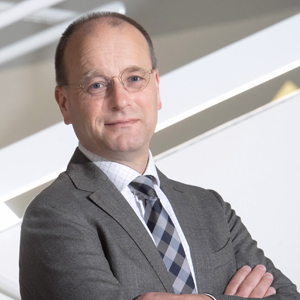
Vice President of the Human Sciences Section of the Max Planck Society and Director of the Center for Lifespan Psychology at the Max Planck Institute for Human Development in Berlin, Germany
Ulman Lindenberger is Vice President of the Human Sciences Section of the Max Planck Society and Director of the Center for Lifespan Psychology at the Max Planck Institute for Human Development in Berlin, Germany. Together with Ray Dolan, he also directs the Max Planck University College London Centre for Computational Psychiatry and Ageing Research, located in London and Berlin. Ulman Lindenberger studied psychology and biology in Berlin and Berkeley. He completed his doctoral degree and habilitation in psychology at the Freie Universität Berlin, and then held a professorship at Saarland University. Currently, he holds honorary professorships with the Freie Universität Berlin, the Humboldt-Universität zu Berlin, and Saarland University. His research interests include behavioral and neural aspects of plasticity across the lifespan, age changes in brain-behavior relations, lifespan developmental theory, and multivariate developmental methodology. He is a member of the German National Academy of Sciences Leopoldina, and received the Gottfried Wilhelm Leibniz Prize 2010 of the Deutsche Forschungsgemeinschaft.
Astrid Linder
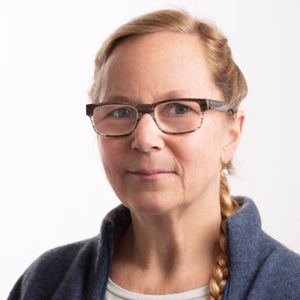
Professor in Traffic Safety and Research Director of Traffic Safety at Swedish National Road and Transport Research Institute, VTI and she is an Adjunct Professor in Injury Prevention at Chalmers University
Astrid Linder is Professor in Traffic Safety and Research Director of Traffic Safety at Swedish National Road and Transport Research Institute, VTI and she is an Adjunct Professor in Injury Prevention at Chalmers University. She received her PhD in traffic safety from Chalmers University of Technology from where she also has a MSc in Engineering Physics. Traffic safety, models of the human in crash testing, injury prevention and crash related countermeasures are main fields of her research activity in which she has extensively published and presented around the world during the last two decades. She has been appointed expert of the Transport Advisory Group (TAG) and Advisory Group on Gender for the research programme Horizon 2020 by the European Commission during 2014-2017. She has coordinated the EU-funded project ADSEAT where the world first virtual dummy model of an average female for rear impact, EvaRID, was developed. Astrid is the coordinator of the EU-funded project VIRTUAL in which an Open Source Human Body Model of an average female and males for Virtual Testing are being developed.
Marcela Linková
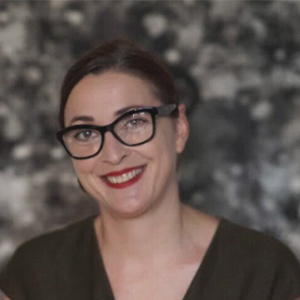
Head of the Centre for Gender and Science at the Institute of Sociology, Czech Academy of Sciences
Marcela Linková, PhD, is the Head of the Centre for Gender and Science at the Institute of Sociology, Czech Academy of Sciences. Her research focuses on gendered organizations, research careers, governance of research and research assessment from a gender perspective as well as research policy analysis from a gender perspective. She is the chair of the ERAC Standing Working Group on Gender in Research and Innovation, and has served on expert and advisory bodies of the European Commission and in the Czech Republic. She is active in developing policy solutions for gender equality in research at the Czech and EU levels. She has been involved in several EU funded projects; most recently, she is the coordinator of Horizon 2020 GENDERACTION project and participates in GE Academy, Gender-SMART, CASPER and UniSAFE. She is co-editor of Gender and Neoliberalism in Czech Academia (Sociologické nakladatelství, 2017). Her work has appeared in European Journal of Women’s Studies, Gender and Research, Science and Public Policy, among others.
Ingrid Lynch
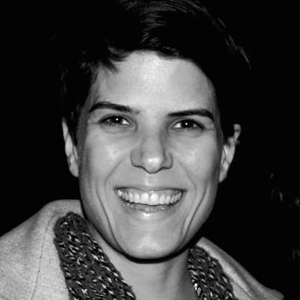
Senior Research Specialist in the Human Sciences Research Council (HSRC) Human and Social Capabilities Division and a Research Fellow in the Critical Studies in Sexualities and Reproduction Programme at Rhodes University, South Africa
Dr Ingrid Lynch is a Senior Research Specialist in the Human Sciences Research Council (HSRC) Human and Social Capabilities Division and a Research Fellow in the Critical Studies in Sexualities and Reproduction Programme at Rhodes University, South Africa. Prior to joining the HSRC she headed the Research, Advocacy and Policy programme at the LGBTIQ+ Human Rights NGO, Triangle Project. Her research examines the socio-cultural determinants of sexual and reproductive health and rights (SRHR) and gender-based violence (GBV), with current projects focused on Eastern and Southern Africa. Her work employs intersectional, gender-transformative, and participatory methodologies and she holds expertise in critical policy analysis and evidence synthesis.
Sally Male
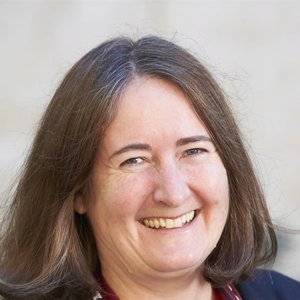
Director of the Teaching and Learning Laboratory in the Faculty of Engineering and IT, and Professor of Engineering and Technology Education at The University of Melbourne
Dr Sally Male joins The University of Melbourne on 5 April 2021 as the Director of the Teaching and Learning Laboratory in the Faculty of Engineering and IT, and Professor of Engineering and Technology Education. From 2017 until March 2021 Dr Male has held the Chair in Engineering Education at The University of Western Australia. Dr Male leads a program of research in higher education focusing on women in engineering and computing, curriculum development in higher education, and engineering employability. She works with educators, industry and students to develop, evaluate and enhance evidence-based education. Her vision is for all engineering graduates to develop capability to lead successful lives contributing to society. Dr Male is a Fellow of Engineers Australia, and Editor-in-Chief of the Australasian Journal of Engineering Education. In 2017, Dr Male was awarded the Engineers Australia Medal in Western Australia for contributions to enhancing practice and inclusion through engineering education.
Verena Mauch
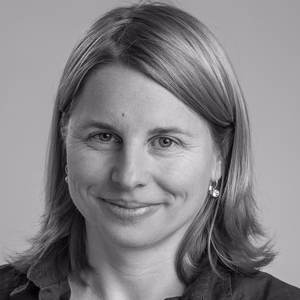
Central coordinator of working and leadership culture programs at MPG
Verena Mauch completed a professional training in publishing in Hamburg in 2002. After a brief stint in a French publishing house she obtained a Bachelor’s degree in social sciences and a Master’s degree in public policy at the Hertie School of Governance Berlin. She wrote her Master’s thesis in collaboration with the World Health Organization’s Stop TB Department and joined thereafter KNCV Tuberculosis Foundation in the Den Haag as a TB consultant. This work took her to many countries in Eastern, Southern and Western Africa and China supporting the national TB programs of the Ministries of Health, followed by a PhD in Public Health at University Nijmegen Medical Center. In 2012, Verena joined the Max Planck Gesellschaft General Administration in Munich and served as an interface between the overall MPG leadership and the management of several institutes. In 2019, she joined the new Human Resources Development and Opportunities Department as central coordinator of working and leadership culture programs, dealing amongst others with MPG’s employee surveys.
Alice McGushin
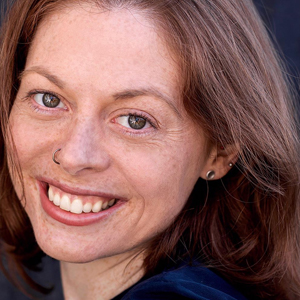
Programme Manager for the Lancet Countdown
Dr Alice McGushin is the Programme Manager for the Lancet Countdown: tracking progress on health and climate change, an international, multidisciplinary collaboration of academic and UN institutions that monitor the world’s response to the health effects of climate change. Before joining the Lancet Countdown, Alice trained as medical doctor in Tasmania and Western Australia. From the very beginning of her medical studies, Alice developed a passion for global health and has been working in the area of climate change and health, alongside her medical training, at the local, national and international level for the past decade. She completed an MSc Public Health (Environment and Health) at London School of Hygiene & Tropical Medicine and has also worked as a consultant for several actors, including the World Health Organization, the Canadian Association of Physicians for the Environment and the World Organization of Family Doctors. She is also a competitive ultra-marathon runner.
Sandra McNally
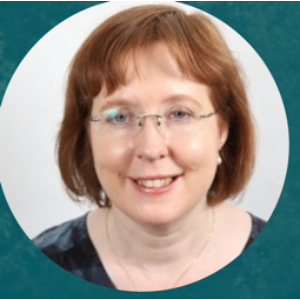
Professor of Economics at the University of Surrey
Sandra McNally is a Professor of Economics at the University of Surrey. She is Director of the Centre for Vocational Education Research, London School of Economics and is also Director of the Education and Skills Programme, Centre for Economic Performance, London School of Economics. Research interests include economic evaluation of government policies in schools and further education; labour market returns to education and training. She is a co-editor of the Economics of Education Review.
Bahar Mehmani
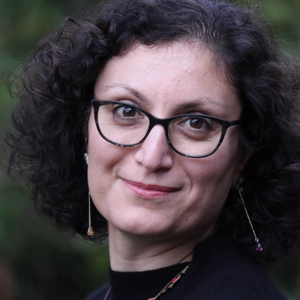
Reviewer Experience Lead in the Global STM journals at Elsevier.
Dr. Bahar Mehmani is Reviewer Experience Lead in the Global STM journals at Elsevier. She works on several peer review initiatives and projects, all of which are designed to recognize reviewers' contribution to the progress of science. Bahar is a member of Peer Review Week steering committee. She is also vice-chair of the peer review committee and council member of the European Association of Science Editors (EASE). She received her PhD in Theoretical Physics from the University of Amsterdam (UvA) in 2010. Before joining Elsevier, she was a postdoc researcher at Max Planck Institute for the Science of Light (MPL).
Michael Meister
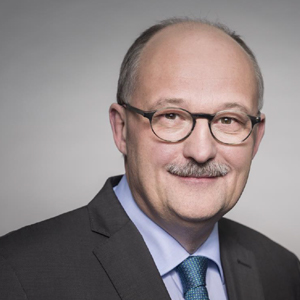
Parliamentary State Secretary at the Federal Ministry of Education and Research
Michael Meister was born on 9 June 1961. He holds a doctorate in mathematics and has been a member of the German parliament, the Bundestag, since 1994. From 2002 to 2004 he was chairman of the finance working group of the CDU/CSU parliamentary group in the Bundestag. Subsequently, until the end of 2013, he served as deputy chairman of the CDU/CSU parliamentary group, where his responsibilities included fiscal and budgetary policy. From December 2013 to March 2018 he was Parliamentary State Secretary at the Federal Ministry of Finance. Since March 2018, Meister has held the position of Parliamentary State Secretary at the Federal Ministry of Education and Research.
Albert Motivans

Head of Data and Research for Equal Measures 2030
Albert Motivans is the Head of Data and Research for Equal Measures 2030, a civil society and private sector-led data and advocacy initiative. He develops innovative approaches to generate, analyze and visualize new and existing sources of development data and to strengthen the technical capacity of national partners to use data to improve policies and development outcomes. He led the design of a comprehensive global tool to measure the status of girls and women - the SDG Gender Index - which was launched in June 2019. Prior to joining Equal Measures 2030, he led education statistics at the UNESCO Institute for Statistics where he oversaw the global education database and efforts to communicate, visualize and analyze data. He has worked in the fields of data and development for the UNICEF Office of Research and the U.S. Census Bureau and has published widely on the use of data to inform policies in child welfare, education, and gender equality. He is a member of various global technical panels, task forces, advisory groups and is an elected member of the International Statistical Institute.
Jörg Müller
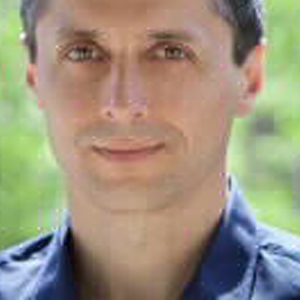
Senior Researcher at the Internet Interdisciplinary Institute (IN3 – UOC) in Barcelona, Spain
Jörg Müller is Senior Researcher at the Internet Interdisciplinary Institute (IN3 – UOC) in Barcelona, Spain where he forms part of the Gender and ICT research program. He obtained his PhD in Communications at the European Graduate School (EGS) in Saas-Fee, Switzerland and holds a degree in Sociology and Computer Science from the Free-University in Berlin, Germany. He has coordinated in several European projects, including the GEDII project on Gender Diversity in Teams and GenPORT - a portal for gender and science resources. He is currently coordinating the ACT project on Communities of Practice to accelerate institutional change on gender equality in the European Research Area.
Nil Mutluer
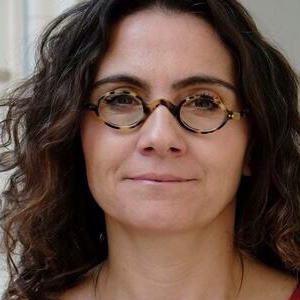
Einstein Foundation Senior Scholar in the Diversity and Social Conflict Department at Humboldt-Universität zu Berlin, Germany
Dr. Nil Mutluer, (PhD, Gender Studies, Central European University, Budapest) is currently the Einstein Foundation Senior Scholar in the Diversity and Social Conflict Department at Humboldt-Universität zu Berlin, Germany, where she was an interim professor of Public Law and Gender Studies Department in 2018. Until February 2016 she was the Head of Sociology Department at Nişantaşı University, but after she signed the Peace Petition titled "We Will Not Be Party to this Crime" she was fıred from her position by the university administration. Then, she was awarded the Philipp Schwartz Research Fellowship of Alexander von Humboldt Foundation (2016 – 2018). She has published extensively in the areas of diversity (gender, ethnic and religious), nationalism, migration, memory studies and Turkish politics in various academic and non-academic journals and newspapers. She is the author of Kurdish Men in Istanbul: Forced Migration and Drive for Inclusion in Everyday Life (forthcoming, 2021) and the editor of the books States of Gender: The Intersectional Borders of Gender in Turkey (2008), States of National: Citizenship and Nationalism, Are We Aware? (2008) and co-editor of Transnational Othering -Global Diversities: Media, Extremism and Free Expression (2019, with Elisabeth Eide, Kristin Skare Orgeret). She co-produced the weekly sociological and political analysis television show ÖteBeri broadcasted on IMC TV (with Emine Uçak). She is the consultant of the 46th Antalya Golden Orange Award (Altın Portakal Ödülleri) winning documentary called “Me and Nuri Bala” (2009, directed by Melisa Önel) which is about the life story of the first feminist transvestite stand up artist of Turkey, Esmeray. She is the founding member of SODA (Social Solidarity Network), and active members of Green Thought Association, the Helsinki Citizens Assembly (hYd) and P. E. N. Turkey.
Marceline Naudi
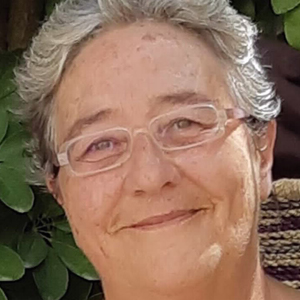
Ssocial worker and Head of Department of Gender and Sexualities, at the University of Malta
Dr Marceline Naudi (Ph.D.(Manchester)) is a social worker by profession and Head of Department of Gender and Sexualities, at the University of Malta. She lectures and supervises student research on gender issues, violence against women, LGBTIQ+ and other anti-oppressive issues at Diploma, Bachelor, Master and Doctoral level. She is Regional Editor of the Journal on Gender Based Violence, and is active on the issues of gender equality and violence against women, LGBTIQ+, as well as wider human rights issues, both in Malta and in Europe. She is President of GREVIO, the Council of Europe monitoring body of the Istanbul Convention, and a member of the Women Against Violence Europe (WAVE) Advisory Board, as well as part of the core coordinating group for the European Observatory on Femicide. She has lead EU funded research projects in Malta on the Bystanders Approach to Sexual Harassment, and on Barriers to Reporting for victims of Violence against Women, and is currently involved in two EU funded projects on Femicide.
Dorothy Ngila
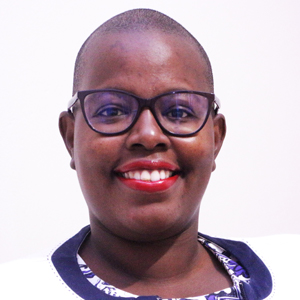
Project specialist in the Strategy, Planning and Partnerships business unit, National Research Foundation (NRF), South Africa
Dorothy Ngila advances her career at South Africa’s National Research Foundation (NRF) as a project specialist in the Strategy, Planning and Partnerships business unit. Her core responsibility is to coordinate the NRF’s contribution to the multi-stakeholder and multi-agency capacity strengthening programme, the Science Granting Councils Initiative (SGCI) in sub-Saharan Africa, which serves 15 public science granting councils in East, West and Southern Africa, and to support the NRF’s strategic engagements in the rest of the continent. To advance conversations and actions promoting the equality and status of women in research, she is chair of the Organization for Women in Science for the Developing World (OWSD) South African National Chapter; serves on the Global Research Council (GRC) Gender Working Group representing the NRF and Sub-Saharan Africa region; serves on the Gendered Innovations Global Advisory Board to evaluate funding agencies for their policies on sex, gender, and intersectional/diversity analysis across 7 continents; and on the African Academy of Sciences (AAS) Gender and Science Steering Committee. Prior to joining the NRF, she served in various capacities within the international partnerships programme of the Academy of Science of South Africa (ASSAf). Ms Ngila possesses a Masters degree in Geography and Environmental Management from the University of KwaZulu-Natal (UKZN), South Africa and a Bachelor of Arts (Public Administration and Environmental Sciences) from the University of Botswana.
Lidia Núñez
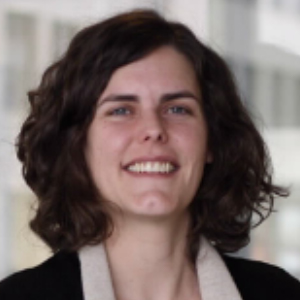
Expert at IDEA Consult
Lidia Núñez (PhD) in an expert at IDEA Consult, a Brussels-based organisation active in policy-oriented research and advise. She obtained a PhD in Social and Political Sciences at the Université Libre de Bruxelles in 2015, where she also worked as a post-doctoral researcher. Before joining IDEA Consult, she worked for the French Ministry of Foreign Affairs and International Development. In Spain, she worked for the Ministry of Education, the Center for Advanced Study in the Social Sciences (CEACS) of the Juan March Institute, and the Centre for Sociological Research. Her main interests focus on R&I ecosystems and policies, including the access to and impact of R&I initiatives and infrastructures, as well as on topics related to human capital for innovation. She has been involved since 2016 in the consecutive MORE surveys on behalf of DG Research and Innovation. These surveys are a large-scale and over time monitoring tool for tracking progress towards an open labour market for researchers. The MORE surveys constitute unique sources of information for the analysis of the working conditions, career paths and international, interdisciplinary and intersectoral mobility of European researchers.
Sonja Ochsenfeld-Repp
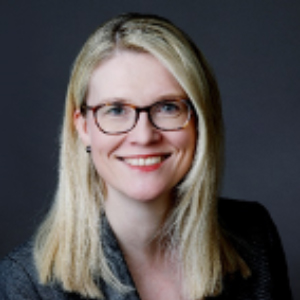
Head of the Division “Equal Opportunities, Research Integrity and Cross-Programme Development”, German Research Foundation
Since July 2018 she is Head of the Division “Equal Opportunities, Research Integrity and Cross-Programme Development”, German Research Foundation. Before she has been Deputy Head of Division “Quality and Programme Management” (2016-2018). Her focus is on the promotion of equity, diversity and inclusion, safeguarding good research practice and international cooperation. From 2012 to 2015 she was Deputy Director of the European Liaison Office of the German Research Organisations (Kowi) and Head of the Bonn office. She was coordinator of the KoWi-Part of the National Contact Point for the European Research Council (ERC). She is a fully qualified lawyer by training and has been awarded a doctoral degree from the University of Bonn in 2007. She has participated as a speaker or chair in many national, European and international conferences.
Mary Olson
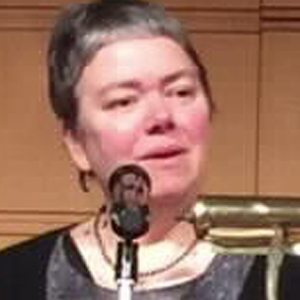
Founder, and acting Director of Gender and Radiation Impact Project (GRIP)
Mary Olson is the founder, and acting Director of Gender and Radiation Impact Project (GRIP) a non-government, educational organization based in North Carolina, USA. Originally a student of Biology and Life Science Olson’s work on radiation is rooted in a three-decade career as an educator and advocate for better radioactive waste policy in the United States. During that work, a novel question was posed to Olson, on whether biological sex is a factor in radiation harm. In 2011 Olson undertook an independent gender analysis of the data reported in the US National Academy of Science (NAS) report on the Biological Effects of Ionizing Radiation, which is primarily from the A-bomb survivors from Hiroshima and Nagasaki. Her findings were striking and resulted in a series of presentations in United Nations proceedings, including the Vienna Conference on the Humanitarian Impacts of Nuclear Weapons in 2014, the 2015 Review Conference of the Nuclear Nonproliferation Treaty (NPT) and in 2017 during the negotiation phase of the new Treaty on the Prohibition of Nuclear Weapons (TPNW). Olson was also hosted to present the findings that radiation is more harmful to females compared to males, by the International Committee of the Red Cross both in 2016 and 2020. She has also presented at Gender Summits (EU) in 2016 and 2018.
Elisabeth Pain
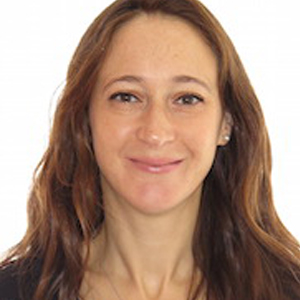
Science Careers Contributing Correspondent, Europe
Elisabeth has been covering career issues in Europe and beyond for Science Careers, the online jobs and career guidance magazine of the journal Science, since 2002. Today based in Barcelona, she has written extensively on the academic job market, alternative careers, diversity in science, and work-life balance for early-career scientists. Elisabeth first obtained an engineering diploma in biotechnology from her native France, followed by a Ph.D. in immunology from the University of Bristol in the United Kingdom. Finding her calling in science journalism, she went on to obtain a postgraduate diploma in journalism studies from Cardiff University, supported by a scholarship from the Association of British Science Writers.
Eleni Papadimitriou
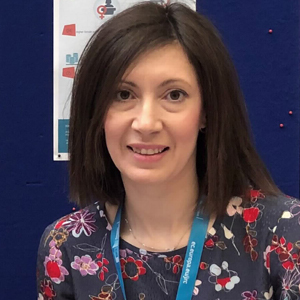
Policy analyst and researcher, Competence Centre on Composite Indicators and Scoreboards (COIN),Joint Research Centre (JRC), European Commission
Eleni Papadimitriou is an experienced policy analyst and researcher that works at the Competence Centre on Composite Indicators and Scoreboards (COIN) at the Joint Research Centre (JRC) of the European Commission. Her main work interest is indicator frameworks and composite indicators primarily in the field of gender and social inequalities but also sustainable development and environment. She is part of the teams developing the Regional Gender Equality monitor, the Gender Equality Strategy monitoring portal and the EU MIMF - a framework measuring multidimensional inequalities in the EU. Prior to joining COIN, Eleni worked in the Climate Risk Management Unit of the JRC, developing an index for climate resilient development and studying sustainable development indicators. Her previous work experience includes also the private sector where she has a long-term experience as statistician and market research analyst. Eleni has studied Mathematics in the National Kapodestrian University of Athens and Statistics in the Athens University of Economics and Business.
Hans-Christian Pape
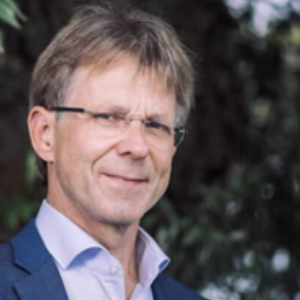
President of the Alexander von Humboldt Foundation and Head of Medical Faculty’s Institute of Neurophysiology at the WWU Münster.
Hans-Christian Pape heads the Medical Faculty’s Institute of Neurophysiology at the WWU Münster. Since January 2018, he is President of the Alexander von Humboldt Foundation. Pape is a leading expert in the neurophysiological foundations of emotional behavior and gained a special reputation for his research on anxiety and anxiety-related disorders, fear and fear memory as well as the processes regulating sleep and wakefulness. In recognition of his work, Pape has won many distinguished research awards such as the Gottfried Wilhelm Leibniz Prize and the Max Planck Research Award. In addition to conducting research, Hans-Christian Pape is active both nationally and internationally in a number of advisory and consultative bodies. In 2005, he became a member of the German Academy of Sciences Leopoldina and from 2011 until 2017, was a member of the German Council of Science and Humanities, advising the federal and Länder governments on the content-based and structural development of universities, science and research in Germany. In this capacity, he was most recently head of the Scientific Commission and was a periodic member of the Executive Committee. Since 2017, he has been a member of the Selection Commission for the Gottfried Wilhelm Leibniz Prize, awarded by the Deutsche Forschungsgemeinschaft.
Michelle Parkouda
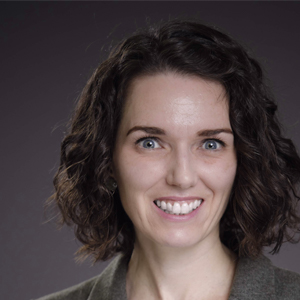
Manager, Research at the Standards Council of Canada (SCC)
Michelle is the Manager, Research at the Standards Council of Canada (SCC). She is responsible for leading research to demonstrate the economic and social value of standardization. She recently authored the report, When One Size Does Not Protect All: Understanding Why Gender Matters for Standardization. Prior to joining SCC, Michelle was a Senior Research Associate at The Conference Board of Canada, one of the largest think tanks in Canada. While there she was a key presenter in a series of cross-country workshops highlighting the importance of internationally trained workers for the Canadian economy. Michelle completed a Postdoctoral Fellowship at the University of Ottawa, she has a PhD in Experimental Psychology from McGill University and a BSc in Kinesiology & Health Sciences and Psychology from York University.
Elizabeth Pollitzer
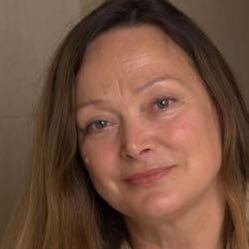 Director, Portia Ltd, UK; founder, Gender Summit
Director, Portia Ltd, UK; founder, Gender Summit
Elizabeth Pollitzer, (PhD (InfSc), BSc (Bio/Phys)) is the founder and director of Portia, which set up the Gender Summit in 2011 and has co-convened each summit since then. She is expert evaluator and adviser for the European Commission, and is involved in several EU projects. Elizabeth Pollitzer PhD is founder and Director of Portia, an organization devoted to improving gender equality in STEM and promoting the inclusion of the gender dimension in STEM. She has 20 years’ experience teaching and researching in the Departments of Computing and Management at Imperial College, University of London. Her original training was in Biophysics. She now applies this scientific background to her work as director of Portia. Portia was the coordinator of the genSET project, the Gender Summits were established as part of the genSET project.
Robert Quinn

Human rights advocate, lecturer, founding executive director of Scholars at Risk (SAR), and host of the Free to Think podcast.
Robert Quinn is a human rights advocate, lecturer, founding executive director of Scholars at Risk (SAR), and host of the Free to Think podcast. SAR is an international network of more than 500 higher education institutions and thousands of individuals in more than 40 countries dedicated to protecting at-risk scholars, promoting academic freedom and defending everyone’s freedom to think, question and share ideas. Mr. Quinn is the author of, among others, Why university rankings must include academic freedom (with Janika Spannagel and Ilyas Saliba), University World News, March 2021; Biden promises truth after Trump's lies. How to hold leaders accountable for their words, THINK blog (nbcnews.com), January 2021; The Fight to Protect--and Define--Academic Freedom, in Academe, the magazine of the AAUP, October 2019; Free speech is not enough, in AAC&U, Diversity & Democracy, summer 2017; and V.E.R.I.T.A.S., opening remarks at the Scholars at Risk 2018 Global Congress. He is a co- editor on Free to Think, SAR’s annual reports on attacks on universities worldwide (November 2019), and co-lead instructor on the free online course Dangerous Questions: Why Academic Freedom Matters.
Evelyn Regner
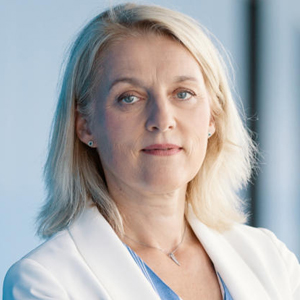
Chair of the Committee on Women's Rights and Gender Equality and deputy head of the delegation of the Social Democratic Party of Austria to the EU Parliament
Evelyn Regner is the chair of the Committee on Women's Rights and Gender Equality and deputy head of the delegation of the Social Democratic Party of Austria to the EU Parliament. As an experienced EU parliamentarian, lawyer and trade unionist, her work focuses on the situation of workers, women's rights and the fight for fiscal justice. Born on the 24th of January 1966 in Vienna, she studied law in Vienna and Salzburg. Since 2009, the trade unionist has been fighting as an MEP for everyone to have a good life. In the current parliamentary term, Evelyn Regner is chair of the Committee on Women’s Rights and Gender Equality. Before her work in the EU Parliament, she headed the ÖGB European Office in Brussels for nine years. She was also a member of the European Economic and Social Committee (EESC) and a member of the ETUC Executive Committee (European Trade Union Confederation) and has advocated for workers' concerns.
Eva Reichwein
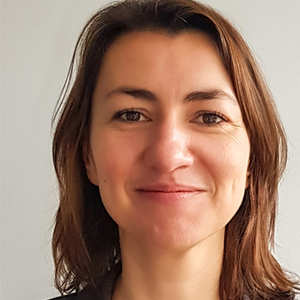
Deputy Head Equal Opportunities, Research Integrity and Cross-Programme Development Division DFG
Dr Reichwein studied Social and Economic history, German Literature and Media at the Philipps-University Marburg. She was awarded her PhD in Social and Economic history in 2010 with a study on child poverty in Germany. Before joining the DFG she has worked as a research fellow at the central office of the Max Weber Foundation and was among others responsible for the “Equal Opportunities Strategy”. Since December 2009 Eva Reichwein is working at the DFG Head Office in Bonn. One of her main tasks have been the development, implementation and monitoring of measures to promote gender equality within the funding portfolio of the DFG. In July 2018 she was appointed Deputy Head of the newly established Division “Equal Opportunities, Research Integrity and Cross-Programme Development”.
Roberta Rincon
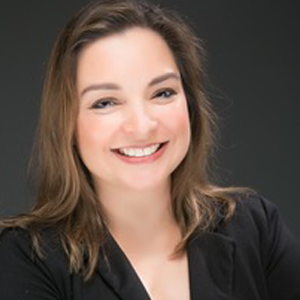
Associate Director of Research for the Society of Women Engineers (SWE)
Roberta Rincon is the Associate Director of Research for the Society of Women Engineers (SWE). She oversees the organization’s research activities on gender equity issues affecting women in engineering and technology, through education and career. In this role, she applies her expertise to influence cultural and policy changes in academic, industry, and public policy spheres. Before joining SWE, she conducted research and policy analysis in higher education in Texas in the areas of student success and campus planning. Her Ph.D. is in Educational Policy and Planning from the University of Texas at Austin.
Katharina Scharrer
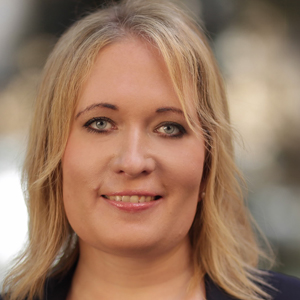
Expert in Diversity and Gender Equality in the personnel development department at the Fraunhofer- Gesellschaft
Dr. Katharina Scharrer studied education and psychology at the University of Augsburg and completed afterwards her doctorate at the University of Augsburg. From 2008 to 2018, she worked as a reasearch assistant and scientific project coordinator in the program "UniMento - mentoring and promotion of young reserachers" at the University of Augsburg. The project focused on measures for equality-oriented promotion of young researchers and personnel development through the use of mentoring and coaching. Based on this remarkable experiences, Katharina Scharrer is now a specialist for career development and competence management as well as for diversity and culture at the Fraunhofer-Gesellschaft in Munich and a systemically trained consultant. The main emphasis of her work focuses on concepts and programs in the area of career development and the promotion of equal opportunities and diversity. In these areas, she contributes professional and methodological expertise to strategically advance cultural development in the Fraunhofer-Gesellschaft, including measures to reduce unconcious bias, to ensure equality for women in science and gender-sensitive language.
Martina Schraudner
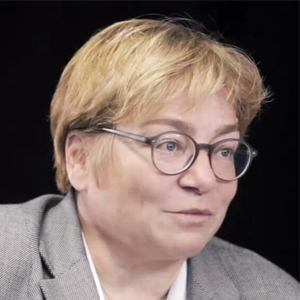
Head of Center for Responsible Research and Innovation of the Fraunhofer IAO and member of board of acatech- Deutsche Akademie der Technikwissenschaften e.V.
Prof. Dr. Martina Schraudner heads the Center for Responsible Research and Innovation of the Fraunhofer IAO and has been on the board of acatech- Deutsche Akademie der Technikwissenschaften e.V. since January 2018. After studying biology and biotechnology and obtaining her doctorate at the Technical University of Munich, she held various positions at the gsf München, the ETH Zurich and the Forschungszentrum Jülich (FZJ) since 1993. Starting in 2001, she was initially involved in the research planning of the Fraunhofer headquarter. Since 2008, she has developed and established the Center for Responsible Research in Innovation. Prof. Dr. Martina Schraudner heads the department "Gender and Diversity in Technology and Product Development" at the Technical University of Berlin. She is active in national and international selection committees for application-oriented research and innovation projects, among others for the expert group "Structural Change" of the EU and the Advisory Board for Gender and Inclusion of Elsevier. Furthermore she is a member of several University Councils (Paderborn, Landshut) and of the Board of the Competence Centre for Technik-Diversity-Chancengleichheit e.V. She is also currently a member of the BMBF's Future Circle and the Caritas Social Commission.
Kate Sim

PhD Candidate at the Oxford Internet Institute
Kate Sim (she/her) is a PhD Candidate at the Oxford Internet Institute where she researches the intersection of sexual justice and emerging technologies. Her doctoral thesis examines how automated and data-driven reporting technologies reconfigure the ecosystem of campus safety in US higher education. She also works as Digital Ethnographer for the European Commission's Next Generation Internet (NGI) Forward project for building a safer and more just Internet.
Dagmar Simon
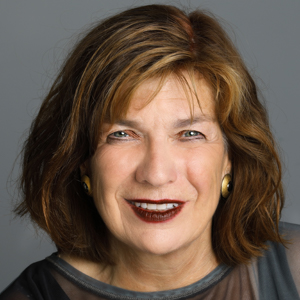
Member of the board of trustees of the University of Applied Sciences (HTW), Berlin, and of the Board of Trustees of the Technology Foundation Berlin
Dr. Dagmar Simon studied political science and German language and literature in Frankfurt/Main and Berlin and received her doctorate (Dr. rer. pol) from the Free University of Berlin. From 1979 to 1989 she worked as an editor and proofreader in publishing houses, editorial offices and magazines. From 1989 to 2016, she worked at the Social Science Research Center Berlin (WZB) in research management (head of the research planning and coordination unit). From 2006 to 2007 she was responsible for the scientific coordination of the "Institute for Research Information and Quality Assurance" (iFQ). In 2008, she became head of the Science Policy Research Group at the WZB, focusing on science policy studies, organisational and gender studies. Since October 2016, she is managing director of "EVACONSULT - Evaluation, Research, Consulting" and guest researcher of the Science Policy Research Group. In addition, from 2008 to 2018, she was a member of the Interdisciplinary Working Group on the Excellence Initiative of the Berlin-Brandenburg Academy of Sciences and Humanities, is a member of the working group "Research-oriented Equality Standards" of the German Research Foundation, co-initiator and member of the "European Network for Research Evaluation in the Social Sciences and Humanities" (ENRESSH) and co-editor of the social science journal "Leviathan". Since 2017, she has been chair of the University Council of the University of Paderborn. In addition, since 2018 she has been a member of the board of trustees of the University of Applied Sciences (HTW), Berlin, and of the Board of Trustees of the Technology Foundation Berlin.
Mangala Sirivinas

Founder and CSO of Cenya Imaging
Mangala started her career in research at the National University of Singapore, before completing her Ph.D. at Carnegie Mellon University (USA). She is the founder and CSO of Cenya Imaging, a spin-off from her academic group at the Radboud University Medical Center in Nijmegen, the Netherlands. Her work focuses on agents for in vivo imaging. Mangala's early work helped establish the field of 19F MRI for quantitative in vivo cell tracking. Mangala is also active in the Young Academy of Europe (YAE), where she served as Chair for two full terms; she also served as Category Chair for the European Molecular Imaging Meetings, twice. Mangala was also shortlisted for the World Molecular Imaging Society WIMIN Outstanding Leadership award in 2019.In addition to her academic career, Mangala worked for GE Healthcare in Strategy, Search and Evaluation, where she helped identify and evaluate emerging technologies in the fields of imaging. Mangala has given many invited talks and been on panels, such as at the International Society for Magnetic Resonance in Medicine, CATAPULT UK, Phacilitate Cell and Gene Therapy, European Infrastructure for Translational Medicine (EATRIS), and WMIC. She has also been invited to several meetings, such as by the International Science Council, the Association of Universities in the Netherlands (VSNU), European University Association (EUA), and UNESCO.
Magdalena Skipper
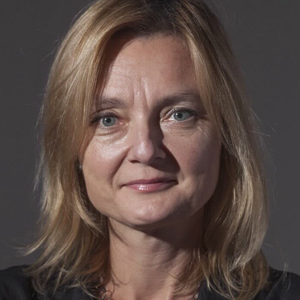
Editor in Chief of Nature and Chief Editorial Advisor for Nature Research
Dr Magdalena Skipper is Editor in Chief of Nature and Chief Editorial Advisor for Nature Research. A geneticist by training, she holds a PhD from University of Cambridge, UK. She has considerable editorial and publishing experience, having worked as Chief Editor of Nature Reviews Genetics, Senior Editor for genetics and genomics at Nature and Editor in Chief of Nature Communications. She is passionate about mentorship, research integrity, co-production in research and innovation in science publishing. As part of her desire to promote underrepresented groups in research, in 2018 she co-launched the Nature Research Inspiring Science Award for early-career female researchers.
Laurel Smith-Doerr
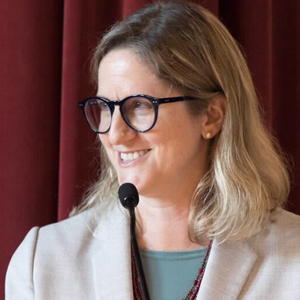
Professor of Sociology at University of Massachusetts, Amherst
Laurel Smith-Doerr is Professor of Sociology at University of Massachusetts, Amherst. Smith-Doerr’s publications on scientific collaboration, gender equity, and organizations have been cited over 17,000 times. She co-edited the 2017 Handbook of Science and Technology Studies (MIT Press), and won the STS Infrastructure award from the Society for Social Studies of Science (4S). Her 2019 article with co-authors in the American Journal of Sociology provides a new organizational level theory of the gender pay gap, and won the 2020 prize for best article from the Inequality, Poverty, and Mobility section of the American Sociological Association (ASA). She was selected as a 2020 Fulbright Scholar to conduct research on AI knowledge production and equity in Hamburg, Germany (postponed due to pandemic). She is PI of the $3M NSF ADVANCE Institutional Transformation grant at UMass Amherst. Currently she serves as the Chair of the Science, Knowledge and Technology section of the ASA, and Vice-President Elect of the Eastern Sociological Society.
Dieter Spath
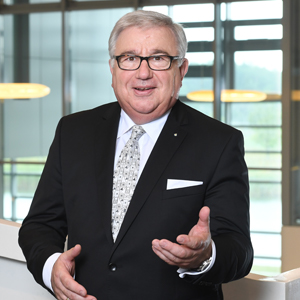
Past President of the German National Academy of Science and Engineering (acatech)
Prof. Dr.-Ing. Dr.-Ing. E.h. Dr. h.c. Dieter Spath, born in 1952, studied Mechanical Engineering at the Technical University of Munich. He completed his doctorate at the Institute for Machine Tools and Industrial Management (IWB) at the TU Munich. In 1981, Spath joined the KASTO group, where he held various management positions, most recently as Managing Director, until his appointment to the University of Karlsruhe in 1992. Until 2002, he headed the Institute of Production Science (wbk) at the University of Karlsruhe. Dieter Spath has been Head of the Fraunhofer Institute for Industrial Engineering (IAO) and the cooperating Institute for Human Factors and Technology Management (IAT) at the University of Stuttgart since 2002. During a leave of absence, Prof. Spath headed Wittenstein AG from 2013 to 2016 as Chairman of the Board. Since 2016 he is back at Fraunhofer IAO and IAT of the University of Stuttgart and since 2017 in addition he is past president of the German National Academy of Science and Engineering (acatech). In recognition of his special merits, Prof. Spath got a honorary doctorate in 2007 by the Technical University of Munich. In 2008 he was awarded the Order of Merit of the Federal Republic of Germany and in 2013 a honorary doctorate of the Technical University of Cluj-Napoca (Romania).
Mina Stareva
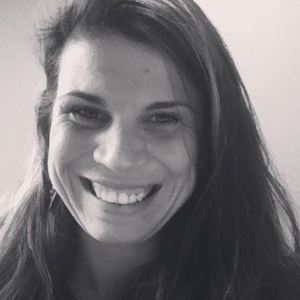
Head of the Gender Equality Sector in DG Research and Innovation, the European Commission
Mina Stareva is the Head of the Gender Equality Sector in DG Research and Innovation, the European Commission. This sector is responsible for devising the EU strategy for gender equality in research and innovation, and the integration of a gender dimension into research and innovation programmes and content. Prior to joining the European values & democracy unit in DG Research and Innovation, she has been working on developing the European Research Area policy and international cooperation.
Clemens Striebing

Senior researcher national and international projects on organizational culture and diversity in innovation processes at Fraunhofer CeRRI
Dr. Clemens Striebing is working at the Fraunhofer Center for Responsible Research and Innovation (CeRRI), where he leads as senior researcher national and international projects on organizational culture and diversity in innovation processes. Clemens Striebing earned his doctorate in 2016 as a sociologist at the University of Heidelberg on the accountability of non-profit organizations. Previously, he studied political science and public law at the Free University of Berlin. Early career stages included a fellowship with the BMW Foundation and participation in a research project on the German foundation system by the University of Heidelberg and the Hertie School of Governance. Clemens Striebing teaches demand-oriented and diversity-sensitive innovation development at TU Berlin. He is a member of the Organizational Sociology Section of the German Society of Sociology (Deutsche Gesellschaft für Soziologie e.V.).
Chiara Tamburini
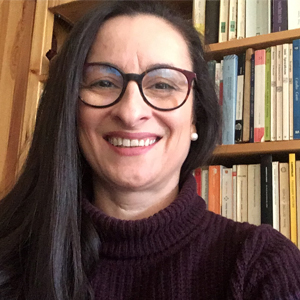
Head of the Equality, Inclusion and Diversity Unit in the DG PERS/HR of the European Parliament
Dr. Chiara Tamburini has a PhD in criminal law and political sociology from the Saint-Louis University (Brussels) and the Università di Ferrara (Italy), a Master degree in Human Rights from the Academie de Louvain (Belgium) and a degree in International Law from the University of Bologna (Italy). From 1997 to 2000, she worked as a lawyer at the European Court of Human Rights in Strasbourg (France). Since 2000, she is working in different positions at the European Parliament (among others the Civil Liberties Committee and the Women’s Rights Committee). She is currently Head of the Equality, Inclusion and Diversity Unit in the DG PERS/HR of the European Parliament. Her main areas of expertise cover anti-discrimination, gender equality, protection inclusion and empowerment of all vulnerable groups.
Maria Zaira Turchi
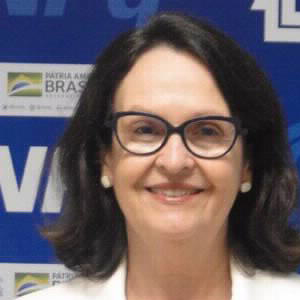
Director for Institutional Cooperation – Brazilian National Council for Scientific and Technological Development - CNPq
Maria Zaira Turchi, PhD in Humanities - Literature, is a Professor at the Federal University of Goiás (UFG). At the University she has served as Coordinator of Postgraduate Programs and as Director of Faculty of Languages, Literature and Linguistics. She is a researcher in the fields of literary criticism and anthropology with books and papers published. She was the President of Goiás State Funding Agency for Scientific Research – FAPEG, and President of the Brazilian National Council of the State Funding Agencies – CONFAP. She had sits on a number of scientific and educational boards, including the National Council of Science and Technology of Brazil (CCT). She served as Director for Research Infrastructure and Training and Education Policies of the Brazilian Ministry of Science, Technology, and Innovation – MCTI. Currently, she is Director of Institutional Cooperation at the National Council for Scientific and Technological Development (CNPq).
Isabel Valera
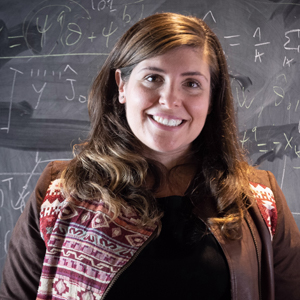
Full Professor on Machine Learning at the Department of Computer Science of Saarland University in Saarbrücken (Germany), and Adjunct Faculty at MPI for Software Systems in Saarbrücken (Germany)
Isabel Valera a full Professor on Machine Learning at the Department of Computer Science of Saarland University in Saarbrücken (Germany), and Adjunct Faculty at MPI for Software Systems in Saarbrücken (Germany). She is a scholar of the European Laboratory for Learning and Intelligent Systems ( ELLIS), where I am part of the Robust Machine Learning Program and of the Saarbrücken Artificial Intelligence & Machine learning (Sam) Unit. Prior to this, she was an independent group leader at the MPI for Intelligent Systems in Tübingen (Germany). She has held a German Humboldt Post-Doctoral Fellowship, and a “Minerva fast track” fellowship from the Max Planck Society. She obtained my PhD in 2014 and MSc degree in 2012 from the University Carlos III in Madrid (Spain), and worked as postdoctoral researcher at the MPI for Software Systems (Germany) and at the University of Cambridge
(UK).
Claartje Vinkenburg
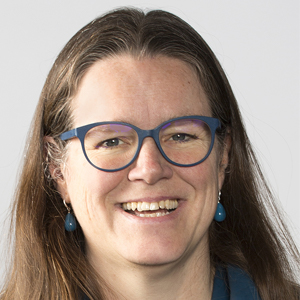
Independent expert consultant and researcher
Claartje Vinkenburg PhD is an independent expert consultant specialized in (gender) diversity in careers. Her area of expertise is careers in academia and professional service firms, where she looks at the impact of implicit bias, normative beliefs, and discursive practices on career patterns and outcomes. Claartje spent 25 years studying and writing on this subject at Vrije Universiteit Amsterdam. She is committed to developing evidence based interventions in to promote diversity in organizations. Claartje is an affliated research consultant with VU Amsterdam, Atria Institute for Gender Equality, and Portia Ltd. Recent clients include research councils, national government and the European Commission.
Dorothea Wagner
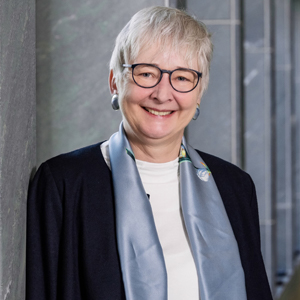
German Science and Humanities Council
Having been a member of the German Council of Science and Humanities (Wissen- schaftsrat) since 2015, computer scientist Dorothea Wagner has been its chair since February 2020. Wagner studied mathematics and had been a full professor for computer science at Halle-Wittenberg and Konstanz, when she became head of the Institute of Theoretical Informatics at the Karlsruhe Institute of Technology (KIT) in 2003. Her research inter- ests are in the field of graph algorithms and computational geometry. Current research activities refer to energy-optimal routes for electric vehicles, or graph methods in the operation of power grids.
Dorothea Wagner received numerous honors and awards, including the GI Fellowship (2008), the Google Focused Research Award (2012), the Werner Heisenberg Medal of the Alexander von Humboldt Foundation in recognition of her commitment to interna- tional cooperation (2018), and, finally, the Konrad Zuse Medal for achievements in computer science (2019). Since 2013, she has been a member of Academia Europaea, and since 2016 a member of acatech – National Academy of Science and Engineering. From 2007–2014 she was Vice President of the German Research Foundation (DFG). Moreover, Dorothea Wagner has been member of scientific advisory bodies, including the International Commission of the Elite Network of Bavaria, the University Council of the Carl von Ossietzky Universität Oldenburg, the Committee of the Alexander von Humboldt Foundation for Research Prices, the Senate Committee on Strategic Projects of the Leibniz Community and the Helmholtz Think Tank.(UK).
Cyrill A. Walters

Postdoctoral Research Fellow, Education Policy Studies, Faculty of Education,Stellenbosch University
Miyoko O. Watanabe
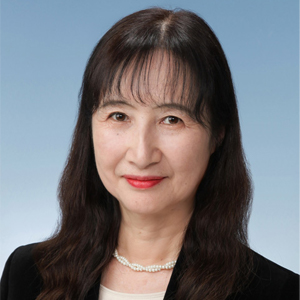
Executive Director and Director of Office for Diversity and Inclusiveness; Chair, Gender Summit 10 Asia-Pacific
Miyoko O. Watanabe is Executive Director at Japan Science and Technology Agency (JST). She is also the agency’s Director of the Office for Diversity and Inclusiveness. Dr Watanabe is a member of the Science Council of Japan and chair of the council’s Committee on Gender-based Science and Innovation. She is also a member of the Specialist Committee on Formulating the Fifth Basic Plan for Gender Equality in Gender Equality Bureau of the Japanese Cabinet Office. She was also appointed STEM girls ambassador by Cabinet office in June 2018, and has been active to promote STEM girls activity. She has a long experience of research in semiconductor physics at Toshiba R&D Center in Japan, and she conducted her physics research as a Postdoctoral Fellow at Dalhousie University, Canada, from 1986 to 1988 and as a Visiting Researcher at the University of Birmingham, U.K., in 1997.
Uta Wehn
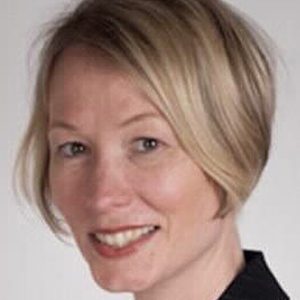
Associate Professor of Water Innovation Studies and Head of the Knowledge & Innovation Studies group at IHE Delft
Uta Wehn is Associate Professor of Water Innovation Studies and Head of the Knowledge & Innovation Studies group at IHE Delft. She is a social scientist with a background in ICTs, drawing on more than 20 years of industrial, research and international development experience. Her work at the intersection of data and knowledge co-creation, digital innovations and water and environment focuses on the social dynamics of innovation and how to harness Citizen Science and social innovation for participatory environmental governance and sustainable development. She is a member of several high level international initiatives, incl. the OECD Water Governance Initiative where she has represented IHE Delft since the start of the initiative in 2013 and currently co-chairs the Community of Practice on Citizen Science & Open Science of the Citizen Science Global Partnership.
Jan Wörner
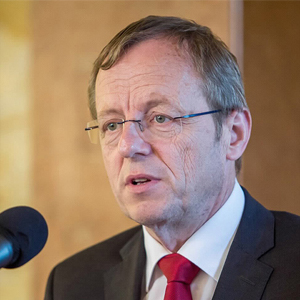
President of acatech
Prof. Dr.-Ing. Johann-Dietrich "Jan" Wörner was elected President of acatech on 19 March 2021. He studied and obtained his doctorate in civil engineering at the Technical University of Darmstadt and took up a professorship in 1990. In June 1995, at the age of only 40, he was elected as one of the youngest university presidents at the time to head the TU Darmstadt. It was one of the first universities in Germany to gain autonomy as a self-governing university. In the meantime, he worked for the engineering firm König und Heunisch and did research in Japan on the earthquake safety of nuclear power plants. From 2007 to 2015, Jan Wörner was Director General of the German Aerospace Center (DLR) and from 2015 to February 2021 Director General of the European Space Agency (ESA).
Gunda Wössner
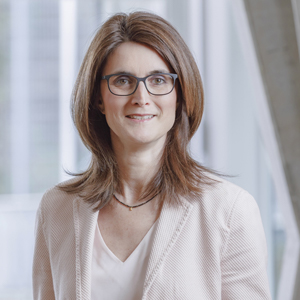
Senior researcher in the Department of Criminology at the Max Planck Institute for the Study of Crime, Security and Law
Gunda Wössner is a psychologist specializing in criminology and forensic psychology. Her main area of research is sexual and violent delinquency with a special focus on investigating the dynamics that explain sexual and violent offending, criminal recidivism, offender treatment and risk assessment, including terrorism risk assessment. Moreover, she utilizes VR to examine criminal behavior. Finally, her past research activities include electronic monitoring and victimology. Gunda Wössner is a senior researcher in the Department of Criminology at the Max Planck Institute for the Study of Crime, Security and Law. She earned her degree as a psychologist and her Ph.D. at the University of Freiburg. In her doctoral dissertation, she developed a typology of sex offenders. From 2004 to 2006 she worked as a clinical psychologist at the University Hospital, Clinic of Psychiatry, Münster, Westfalia. Since 2006, Gunda Wössner has been head of the Max Planck Institute’s longitudinal study “Sex offender in the social therapeutic institutions in the Free State of Saxony, Germany”. From 2015 to 2016 she was professor of psychology at the University of Applied Police Sciences Baden-Württemberg.
Kathrin Zippel
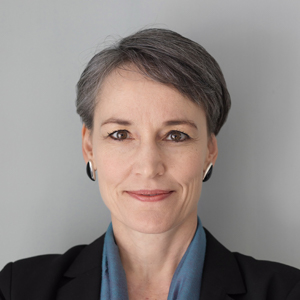
Professor of Sociology at Northeastern University
Kathrin Zippel is Professor of Sociology at Northeastern University. She has published on gender politics in the workplace, public and social policy, social movements, welfare states, and globalization in the United States and Europe. Her book The Politics of Sexual Harassment in the United States, the European Union and Germany (Cambridge University Press) won several awards. Her research has also explored gender and global transformations of science and education, focusing on organizational change processes particularly in universities and STEM organizations. In her book, Women in Global Science: Advancing Careers Through International Collaboration (Stanford University Press), she argues that global science is the new frontier for women, providing both opportunities and challenges as gender shapes the dynamics and practices of international research. She currently directs a research project on the creation and diffusion of innovative gender equity ideas in the network of colleges, university and STEM organizations funded by the National Science Foundation (NSF) through the ADVANCE program. Zippel is a co-chair of the Social Exclusion and Inclusion Seminar at the Minda de Gunzburg Center for European Studies Harvard University and was a residential fellow at the Women and Public Policy Program at the Harvard Kennedy School. She served as co-PI of Northeastern’s National Science Foundation ADVANCE Institutional Transformation grant. She held a Humboldt Research fellowship at the Max Planck Institute for the Study of Societies in Cologne and the Ludwig-Maximilians-University in Munich; was a guest at Radboud University, Nijmegen, the WZB Social Science Research Center in Berlin, and the European University Institute in Florence. Zippel received a Ph.D. from the University of Wisconsin-Madison and was a post-doc at the European Union Center of New York at Columbia University.


































































 Director, Portia Ltd, UK; founder, Gender Summit
Director, Portia Ltd, UK; founder, Gender Summit























